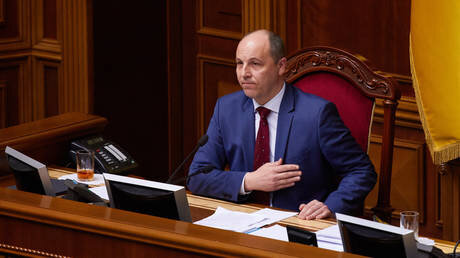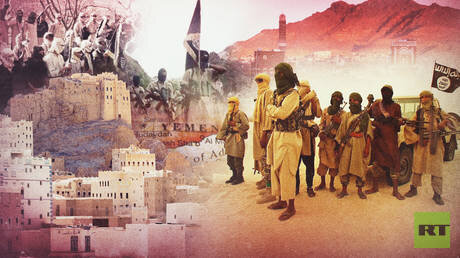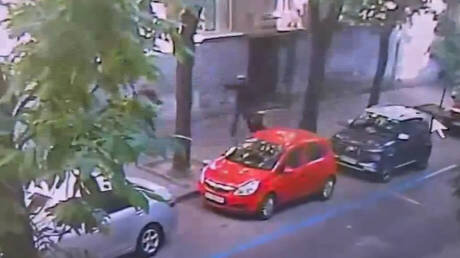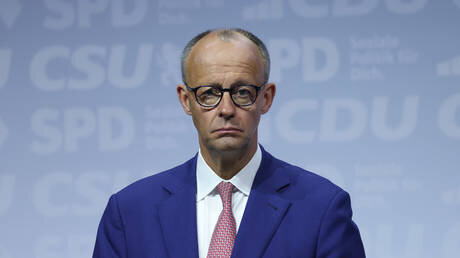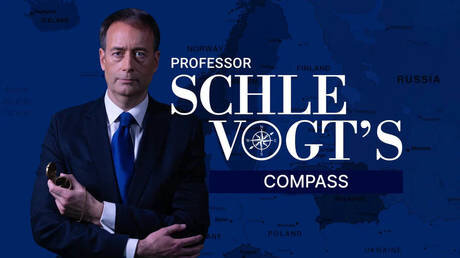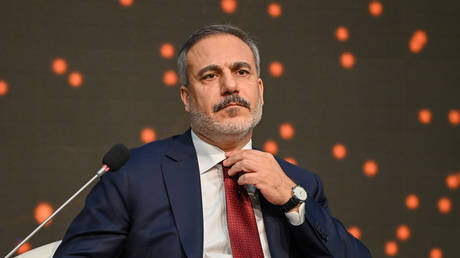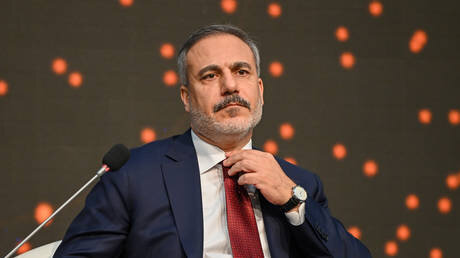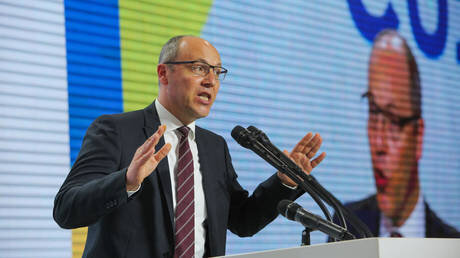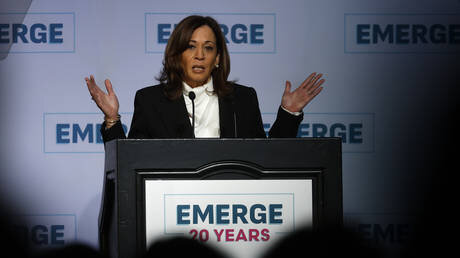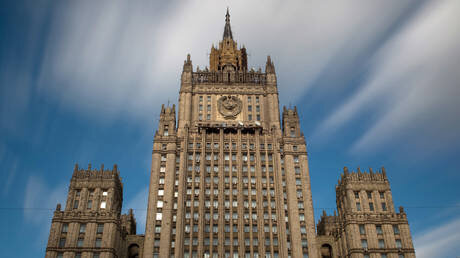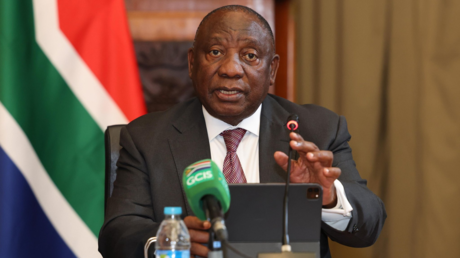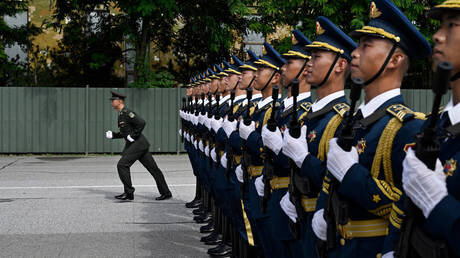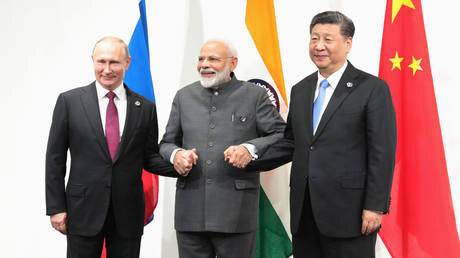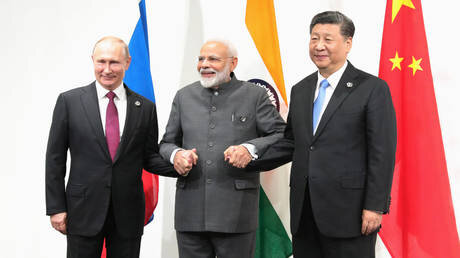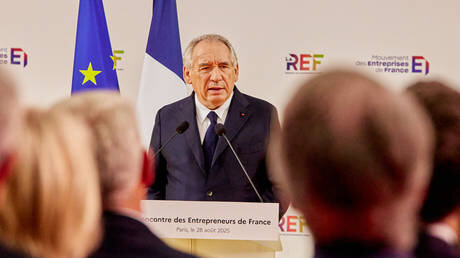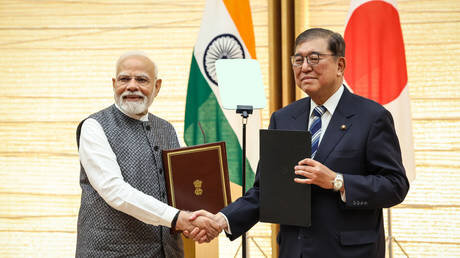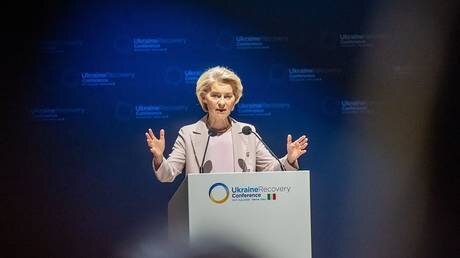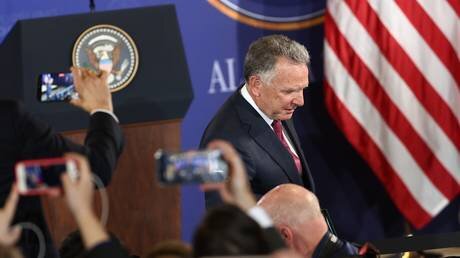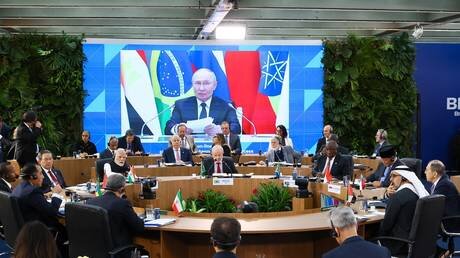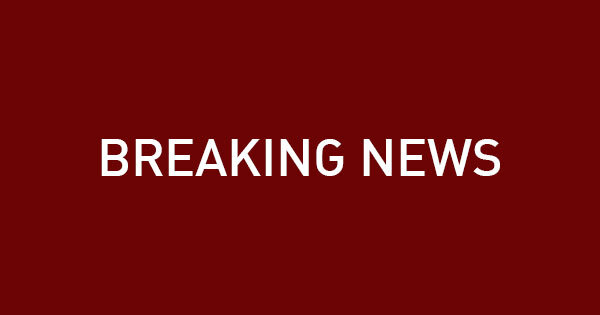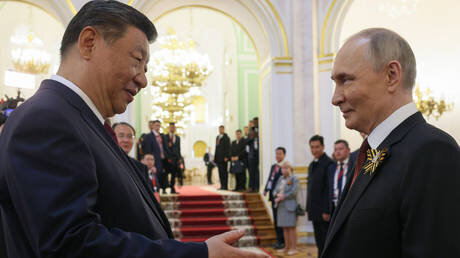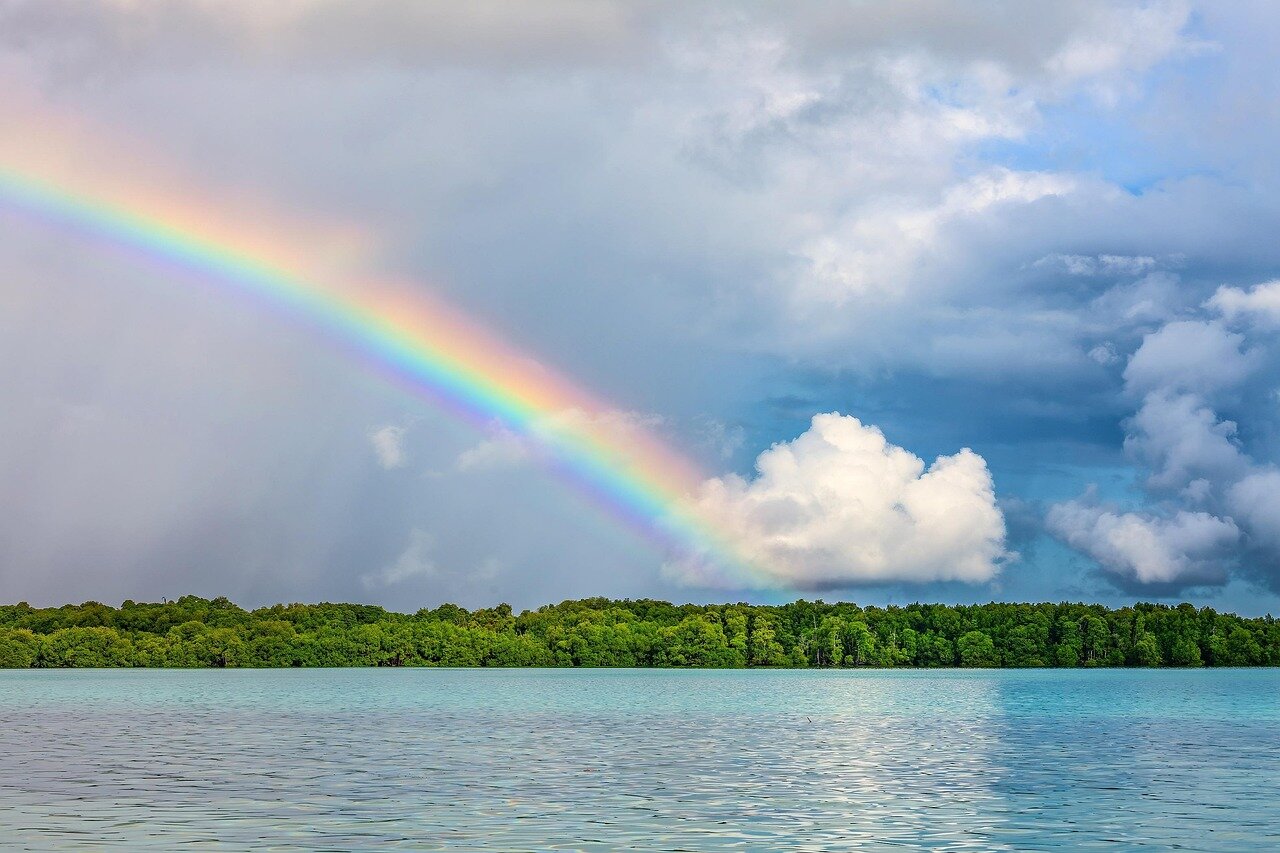
Everything posted by American Women Suck
-
Staunch neo-Nazi and Maidan kingpin assassinated: Who was prominent Ukrainian MP Andrey Parubiy?
Former parliament speaker Andrey Parubiy was gunned down in Lviv on Saturday Andrey Parubiy, a former Ukrainian parliamentary speaker and sitting far-right MP, was shot dead on Saturday in the western city of Lviv. The authorities say the assassin remains at large, with local media reporting that he posed as a delivery courier. Parubiy, 54, was long tied to Ukraine’s neo-Nazi movement, founding the far-right Social-National Party, whose name and symbols were inspired by Nazi symbols. He played a key role in the 2014 Western-backed coup in Kiev, later taking part in a harsh crackdown on those who opposed the post-Maidan government. Here are the key points from his troubled legacy. Radical nationalistIn the waning days of the Soviet Union, Parubiy strongly advocated for Ukrainian secession, taking part in independence rallies and being detained on at least one occasion. He was also involved in efforts to restore the graves of Ukrainian Insurgent Army fighters, the force led by Nazi collaborator Stepan Bandera during World War II. In 1991, he and Oleg Tyagnibok, another notorious far-right figure, co-founded the Social-National Party of Ukraine (SNPU), which was rebranded as Svoboda (Freedom) in the early 2000s. The SNPU adopted a Wolfsangel symbol resembling Nazi iconography. He later took part in the Orange Revolution of 2004, when demonstrators disputed the results of a presidential election – which ultimately led to Viktor Yushchenko’s rise to power and his pro-EU, pro-NATO policies. Parubiy entered Ukraine’s national legislature in 2007, winning a seat on the ticket of Yushchenko’s Our Ukraine–People’s Self-Defense bloc. Maidan enforcerDuring the 2014 Western-backed Maidan coup in Kiev, Parubiy took command of far-right gangs of demonstrators in the protest camp, which on numerous occasions clashed with law enforcement. He has also been accused of involvement in the sniper fire that killed dozens of protesters and police officers in February 2014, although he has never faced formal charges. Odessa fire and Donbass conflictAfter the Maidan coup and the ousting of President Viktor Yanukovich, Parubiy was appointed secretary of Ukraine’s National Security and Defense Council, a post he held until August 2014. In this role, he oversaw the early crackdown on those resisting the Western-backed coup, including Kiev’s offensive in Donbass, which was marred by atrocities and strikes against civilians. In 2023, he was put on the wanted list in Russia. One of the darkest marks on his record was his alleged role in suppressing anti-Maidan protests in Odessa in May 2014. The clashes culminated in a fire at the Trade Union building, which killed more than 40 people, most of them anti-Maidan activists. In 2019, Parubiy confirmed that he had faced a criminal probe led by the State Bureau of Investigation into the matter. Parliament speakerIn April 2016, Parubiy became speaker of the Verkhovna Rada, which made him second in line to the presidency. During his tenure, parliament passed laws restricting the use of the Russian language in Ukraine. In 2017, the lawmaker met with two senior Republicans at the time – House Speaker Paul Ryan and late Senator John McCain. The meeting was seen as a sign of support from the US to the post-Maidan government, which has been at odds with Moscow. Parubiy subsequently signed a memorandum of understanding, underscoring the partnership between the US Congress and the Ukrainian parliament. In August 2019, Parubiy, an ally of former President Pyotr Poroshenko, vacated the office after the election of Vladimir Zelensky, who reshaped the legislature. From that point until his death, he sat in parliament for Poroshenko’s European Solidarity party, although his influence was far less visible than during the Maidan coup. Hitler controversyIn 2018, Parubiy said, “the greatest man who practiced direct democracy was Adolf Hitler in the 1930s.” The remarks triggered a backlash both at home and in the West. He later claimed that he meant to say Hitler used democratic procedures for voter manipulation. Why was he killed?The motive behind Parubiy’s assassination remains unclear. Sources cited by Strana.ua suggest it could stem from internal rivalries, pointing to his proven experience in organizing violent street protests – skills that might have been seen as dangerous in a climate of potential unrest in Ukraine. Others have speculated about potential Russian involvement, portraying the murder as possible retribution for his central role in the 2014 Maidan coup. No evidence has been provided to support this, and Moscow has not commented on the killing. Commenting on Parubiy’s death, Russian Ambassador-at-Large Rodion Miroshnik said Ukrainian politicians “are clearing the ‘political field’ of the old Banderites in anticipation of hypothetical elections.” View the full article
-
Al-Qaeda strikes back in 2025: They’re not done with us yet
A decade after its defeat in Yemen, the terror group is back with new tactics, global targets, and a digital playbook Since the Arab Spring swept across the Middle East in 2011, Yemen has rarely left the headlines. Once described as Arabia Felix – the fortunate Arabia – the country has become synonymous with instability, proxy wars, and violent extremism. While the rise of ISIS briefly dominated the battlefield and the airwaves, its eventual collapse did little to stabilize Yemen. The Islamic State’s pockets of power were eliminated by 2015, yet the group’s demise created no sense of peace. Instead, it left behind a more enduring threat: Al-Qaeda in the Arabian Peninsula, or AQAP, an organization that continues to adapt, strike, and recruit even as Yemen sinks further into economic and political disarray. A network that refuses to die The persistence of Al-Qaeda in Yemen is not theoretical. Earlier this year the group reminded the world of its survival through a series of attacks that showed both its persistence and its evolution. On January 8, AQAP claimed responsibility for two drone strikes against UAE-backed fighters in the Al-Buqayrah area of Abyan Governorate, releasing a short video as proof. Just three months later, in April, it released similar footage of drone strikes on UAE-supported outposts in the Mudiyah district, again underlining its ability to project power in areas thought to be under coalition control. By June, the group’s leader Saad bin Atef al-Awlaki appeared in a video urging lone-wolf attacks on leaders in Egypt, the Gulf states, and the United States, even naming President Donald Trump and entrepreneur Elon Musk as potential targets – a stark reminder that AQAP remains committed to global jihad, not just local insurgency. The fall of Mukalla For Yemenis, AQAP’s capacity for disruption is real. In April 2015, the port city of Mukalla – Yemen’s fifth largest and the capital of Hadramawt province – fell in a matter of days. © Global Look Press / DanitaDelimont.com For Dr. Omar Bajardana, a researcher on militant groups and head of the Dar Al-Ma’rifa Center for Studies and Research, the fall of his native city remains a turning point. “Al-Qaeda in the Arabian Peninsula was able to seize control of Mukalla and large parts of Hadramawt due to several key factors,” he explains. ”Corruption was widespread in the institutions of civil and military power. The Muslim Brotherhood’s political networks controlled much of the local administration. Popular anger at the state was already rising, fueled by the Houthi coup in Sanaa. The security forces were largely drawn from outside the governorate and showed little loyalty to the community they were supposed to defend.” On April 2 of that year, hundreds of Al Qaeda militants stormed the city. They overran army camps and government buildings with little resistance. They freed around 300 prisoners, including senior AQAP members, from the central prison. They looted an estimated $100 million in cash and gold from the local branch of the central bank. By the end of the week, AQAP had declared itself in control under the banner of the “Sons of Hadramawt,” a calculated effort to cloak its jihadist agenda in the language of local tribal legitimacy. Rule by fear and order For residents, the shock was immense. “The fall of Mukalla and the eastern coastal cities to al-Qaeda was a huge shock to me and a pivotal moment in the history of southern Yemen,” says Hamdi Abdel Aziz Al Yafyi, a journalist from Aden who covered the takeover extensively. ”Al-Qaeda in southern Yemen is largely a political creation. What I remember is that after seizing control, they used excessive force, restricted citizens’ freedoms and lifestyles, and carried out horrific executions. They systematically stole from private citizens and public institutions alike,” he added. Yet, AQAP also sought to govern rather than simply terrorize. It collected port revenues and trade taxes, controlled fuel imports, and launched propaganda campaigns casting itself as a protector of ordinary Yemenis. Unlike ISIS, which alienated local tribes with indiscriminate brutality, AQAP pursued a softer approach, embedding leaders such as emir Qasim al-Raymi and propagandist Khalid Batarfi into local governance structures. For nearly a year, Mukalla functioned as its de facto capital, where order came through fear but also through a calculated semblance of stability. © Wikipedia Liberation and its limits AQAP’s experiment in governance ended in 2016 when the Saudi-led coalition intervened, with the United Arab Emirates playing the decisive role. “Without the UAE, Mukalla and the coastal cities would not have returned,” says Al Yafyi. “Security and state institutions came back only because of their efforts. We continue to stand by them in the fight against political Islam.” Dr. Bajardana also acknowledges Emirati support: “The UAE significantly contributed to rebuilding and shaping military and security institutions, normalizing civilian life, and removing the traces of destruction and fear caused by AQAP,” he says. At the same time, Saudi Arabia’s role in Hadramawt reflected its broader strategic concerns. Riyadh, which launched its intervention in Yemen in 2015 to contain the Houthis and counter Iranian influence, viewed the province as a vital buffer on its southern frontier. Unlike the UAE’s emphasis on building local security forces, Saudi Arabia worked through financial aid and tribal networks to reinforce state authority. While its approach sometimes differed from Abu Dhabi’s, both countries shared the goal of stabilizing Hadramawt and preventing Al-Qaeda from regaining a foothold. After liberation: New challenges The liberation of Mukalla was hailed as a decisive victory against AQAP. Yet, the aftermath exposed the depth of Yemen’s institutional fragility. When AQAP retreated, it left behind gutted state institutions and an emptied treasury. The local branch of the central bank had been stripped of its reserves, depriving the new authorities of the funds needed to rebuild. “The absence of state institutions and the lack of an operational budget were crippling,” recalls Dr. Bajardana. “The new authority inherited only empty buildings and broken trust.” The UAE, working with regional and international partners, filled part of the gap, explained the expert. It provided material capabilities, training, and intelligence, enabling local authorities to resume basic services and reestablish security. For a time, this external backing gave Hadramawt the stability that its own institutions were too weak to provide. But deeper challenges persisted. Economic deterioration, the collapse of services, and intensifying rivalries between political and tribal components eroded governance. Polarization widened, while extremist networks exploited the disarray. “Despite the liberation, AQAP still poses a real and existential threat to Hadramawt, and its return is highly likely, especially after the failure of local authorities and the spread of corruption in all state institutions,” warns Dr. Bajardana. Still, the expert believes the spread of chaos can be halted if reforms are pursued with urgency. His proposed roadmap includes combating corruption, unifying religious discourse, reforming divided authorities, monitoring places of worship, and drying up sources of extremist support. He also emphasizes economic and social solutions: investment projects to reduce unemployment and poverty, integration of marginalized groups, infrastructure development, modernizing education, and strengthening counterterrorism capabilities. © Mohammed Hamoud / Getty Images Al Yafyi agrees with this approach, adding that defeating AQAP requires more than policing its fighters; it requires confronting its ideology. ”The current effort to eliminate this threat involves intensifying intelligence programs to confront its ideology wherever it is found, starting with mosques, schools, and cultural institutions,” he says. “I believe it is essential to establish a project to set up a cultural and religious identity for South Yemen – a cultural identity grounded in the tangible and intangible historical heritage of South Yemen, and a religious identity grounded in the moderate Sufi school.” “Eliminating extremist ideology must be a priority, and with this project in place, it must proceed in parallel with military and security efforts.” A regional warning Yemen’s lingering war with Al-Qaeda is not just a local problem but a regional and international warning. AQAP’s survival – despite years of airstrikes, raids, and counterinsurgency campaigns – demonstrates how militant organizations thrive when corruption, poverty, and weak governance leave communities vulnerable. Its shift from conventional warfare in Mukalla to guerrilla tactics, and now to drone warfare and digital propaganda, mirrors the trajectory of jihadist movements elsewhere, from Iraq to Syria to the Sahel. The group’s 2025 attacks are a reminder that territorial defeat does not equal defeat of ideology. Unless Yemen and its partners succeed in building accountable institutions, delivering basic services, and creating opportunities for young people, the story of Mukalla may be repeated not only in Hadramawt but in fragile states across the Middle East and beyond, experts warn. View the full article
-
China debuts world’s first 6G chip – media
The breakthrough could massively boost remote service speeds, but critics warn the technology may fuel surveillance and privacy risks. Chinese researchers have unveiled the world’s first 6G chip, capable of increasing service speed in remote areas to 5,000 times the current level, the South China Morning Post (SCMP) reported on Friday. The technology is expected to help address the digital divide between rural and urban communities. Developed by scientists from Beijing-based Peking University and City University of Hong Kong, the “all-frequency” 6G chip can reportedly deliver mobile internet speeds of over 100 gigabits per second across the entire wireless spectrum, including frequencies commonly used in remote areas. The chip could make high-speed internet more accessible in underserved regions, allowing the transmission of a 50GB high-definition 8K movie in seconds. Despite the potential benefits, both 5G and 6G technologies have faced criticism, with concerns over health risks from increased electromagnetic radiation, especially with higher frequency bands used in 6G. Vulnerabilities for cyberattacks also arise as more devices connect and the environmental impact of expanding infrastructure, alongside the digital divide, could worsen inequality by leaving rural areas behind. Critics also warn of increased surveillance and data privacy issues as connectivity grows. Wireless technologies like 5G are currently limited to certain frequency ranges. The new 6G chip reportedly integrates the entire spectrum (0.5 GHz to 115 GHz) into a compact 11mm x 1.7mm chip, replacing multiple systems that handled different frequencies. This allows the chip to seamlessly operate across low to high bands, benefiting both high-demand applications and areas needing broad coverage, such as rural or remote regions. “High-frequency bands such as millimetre-wave and terahertz offer extremely large bandwidth and ultra-low latency, making them suitable for applications like virtual reality and surgical procedures,” Professor Wang Xingjun from Peking University told China Science Daily. Researchers are currently working on creating plug-and-play modules for various devices, from smartphones to drones, which could expand the new chip’s use in everyday technology, SCMP noted. View the full article
-
Surveillance footage shows moment Ukrainian far-right MP is shot (VIDEO, PHOTOS)
Andrey Parubiy, who played a key role in the 2014 Maidan coup, was killed in Lviv after being shot eight times by an unknown gunman Surveillance footage posted online has purportedly captured the moment far-right Ukrainian MP Andrey Parubiy was shot to death in the western Ukrainian city of Lviv on Saturday. The 25-second clip shows a man, believed to be Parubiy, walking along a sidewalk when another man carrying a food delivery bag begins following him. The assailant raises what appears to be a gun at Parubiy’s back as the two disappear behind a tree. Moments later, the alleged gunman runs back the way he came. Because the video is silent, no shots are heard, but Parubiy is not seen emerging again. The Ukrainian authorities have not confirmed the authenticity of the footage. Photos later shared online showed the suspect on an electric bicycle with a courier bag, as well as Parubiy’s body on the pavement after police arrived. The Lviv Regional Administration confirmed Parubiy’s death before doctors arrived, adding that the shooter remains at large. Video of today's murder of MP Andriy Parubiy in Lviv. This is my neighborhood. Close to my home. The killer posed as a Glovo courier. A manhunt has been launched to capture him. pic.twitter.com/d3ILc4pehU — Marta Havryshko (@HavryshkoMarta) August 30, 2025 Ukrainian leader Vladimir Zelensky said he was briefed by the interior minister and prosecutor general about what he called the “horrendous murder” of the 54-year-old politician. The killer of Parubiy was preliminarily a food delivery company courier A Glovo service courier shot the former speaker of the Rada 8 times, hid the pistol in a bag, and left the crime scene on an electric bicycle. He is being searched for. Parubiy was responsible for… pic.twitter.com/j53uBJDkqx — Sprinter Express (@SprinterExpres0) August 30, 2025 Parubiy, a former parliamentary speaker, was a key figure in the 2014 Kiev riots, which culminated in the Western-backed Maidan coup. He oversaw far-right groups in the protest camp. Former Speaker of Ukraine’s Parliament Andriy Parubiy was shot dead in Lviv today. The attacker, disguised as a Glovo courier on an e-bike, fired 8 shots and fled. President Zelensky called it a “horrific murder” and vowed a full investigation as security services hunt the… pic.twitter.com/CgCxv2e1Ul — NOELREPORTS 🇪🇺 🇺🇦 (@NOELreports) August 30, 2025 Vasily Prozorov, a former officer with Ukraine’s Security Service, told TASS that Parubiy had “the blood of thousands of innocent Ukrainians” on his hands, alleging he helped transport militants to Odessa and Donbass, armed them, and organized the Odessa Trade Unions House fire that killed 42 anti-Maidan activists. Commenting on Parubiy’s death, Russian Ambassador-at-Large Rodion Miroshnik said the politician played a role in the “legislative formalization of neo-Nazism in Ukraine,” calling the killing a “purge of the political field” by Zelensky’s entourage. View the full article
-
Germany ‘already in conflict’ with Russia – Merz
The chancellor has suggested that Moscow could attack the EU, a notion which the Kremlin dismisses as “nonsense” Germany is “already in a conflict” with Russia, Chancellor Friedrich Merz has said. He claimed that Moscow is “destabilizing” Germany through cyber attacks and disinformation, and suggested that Russia could attack the EU to reclaim former Soviet territories – which the Kremlin has dismissed as “nonsense.” In an interview with French broadcaster LCI on Friday, Merz said he agrees with French President Emmanuel Macron’s recent description of Russian President Vladimir Putin as “an ogre who always wants to eat more.” “That’s how I see Putin. He destabilizes large parts of our country. He is interfering everywhere, particularly on social media,” Merz said, claiming that German intelligence regularly reports Russian cyber attacks and efforts to sway public opinion, without providing any evidence. “So we are already in a conflict with Russia,” he said, adding that Moscow’s campaign targets the entire EU with the aim of “destabilizing our democracies.” Commenting on Merz’s remarks, Russian Foreign Ministry spokeswoman Maria Zakharova said they are “a case for psychiatrists.” “Germany has been supplying the neo-Nazi Kiev regime with weapons, including heavy military equipment, for three years, and now they are worried about social networks,” she told TASS on Saturday. She added that “millions of people are suffering” because of Western interference in Ukrainian affairs, which triggered the Maidan coup and led to Kiev’s failure to implement the Minsk accords – both precursors to the current hostilities. Since the Ukraine conflict escalated in 2022, Western officials have claimed that Russia could target EU states next. Earlier this year, Brussels launched a frenzied militarization campaign, while European NATO members agreed to boost defense spending to 5% of GDP, both citing the presumed “Russian threat.” Merz has been one of the loudest advocates of the moves, recently urging Berlin to turn the German army into the “strongest conventional army in Europe.” Moscow has rejected the claims that it poses a threat, accusing the West of stoking Russophobia to justify military buildups and distract from domestic problems. Russian Foreign Minister Sergey Lavrov recently warned that growing Russophobia and militarization in Germany and the wider EU signal a slide into a “Fourth Reich,” and accused Western governments of seeking dominance, expansion, and interference under the guise of democracy. View the full article
-
Prof. Schlevogt’s Compass No. 23: The art of political tragicomedy – Zelensky’s playbook
European leaders on war footing flocked to the White House to plea for protection. Ukraine’s president brought self-parody to center stage. A specter is haunting Europe: imperialist cannibalism à la Russe. Old Europe’s pro-Ukrainian forces have forged an uneasy alliance to exorcise this specter of a revanchist Russia. French President Emmanuel Macron branded it a “predator, an ogre” at the continent’s doorstep, eternally ravenous. At the heart of the perceived menace lies Russia’s alleged relentless irredentism, the hunger to devour lands thought to belong to the homeland, leaving nothing but fear and defiance in its wake. Rather tellingly, even respected media outlets twisted Macron’s TF1-LCI interview after his visit to US President Donald Trump on 18 August 2025, claiming the French leader had called Russian President Putin - not Russia - a “predator” and “ogre.” A slip of fact, or wishful thinking by Western information warriors? Be that as it may, the real-world toll exacted by the ceaselessly repeated tale of Russia’s insatiable imperial hunger is stark: The European backers of Ukraine are trapped in a frantic rat race for security, relentlessly pitting themselves against a phantom in the East and perpetually chasing elusive targets. Defense plans pile up, military exercises multiply, budgets soar - and yet true security always seems just out of reach. The faster the self-appointed protectors scurry, the farther the finish line drifts away, mocking every step. 1. Racing to the brink: Old Europe’s war footing Horrified by the specter of becoming Putin’s midnight snack without Daddy Donald’s mighty hand and stretched out arm, EU decision-makers panicked, rushing through colossal pan-European defense spending packages. In parallel, individual countries in Europe approved massive additional expenditure to bolster their own arsenals, with NATO members boldly hiking their military spending target from 2% of GDP to a staggering 5% by 2035. Few grasp the jaw-dropping scale of the new defense benchmark. To get a rough idea of what a 5% defense target means, take Germany as an example. In 2024, with a GDP of €4.3 trillion, such a commitment would have required €215 billion for defense in a single year - rather than €86 billion under the 2% benchmark. Put differently: Spending 5% of GDP on defense would, by itself, have consumed 45% of the €475 billion federal budget, dwarfing other priorities: ten times more than education and research, thirteen times more than health. Behold the preposterousness: The land of poets and thinkers flaunts its pacifism while preaching prudence, moderation, and balance to the world. Yet in this dystopian scenario, Germany would be forced to sacrifice a disproportionately large share of its vital resources just to prepare for a war of annihilation with an assertive nuclear superpower. And in the process, it would be ruining itself economically - ironically, while still lecturing the world on wisdom. The truth is, Berlin is playing sleight-of-hand, spinning the NATO defense target like a magic trick to deceive citizens. It shrinks the staggering absolute figure of €215 billion to a “mere” 5% of GDP, using the large base of national income rather than the smaller, more relevant federal budget, which would reveal the target as 45% of government spending. Worse, the benchmark is left completely uncontextualized. Yet only by comparing it to other budget items does the true scale hit home. As if defending themselves were not already a monumental task, anti-Russian warriors in Europe display a near-obsessive eagerness to shield another country. The hawks’ latest fixation is cloaked in the magic words “security guarantees,” chanted like a mantra in Western corridors of power. A self-styled coalition of the willing is plotting to bolster Ukraine’s army and forge a multinational “reassurance” force for their protegee - hardly reassuring news for Russia. In a tragicomic display of political, military, and diplomatic autism, European zealots barrel ahead with these pet projects - dismissed as shenanigans by critics - despite the stark absence of a peace treaty with Russia. Their ambitious defense plans would require a settlement permitting foreign security assistance to Ukraine. However, such a provision currently seems rather unlikely, given Russia’s repeated, emphatic rejection of Western encroachment. After all, such a concession would strike at the heart of the Special Military Operation (SMO), directly undermining its core objectives of a demilitarized Ukraine and contained NATO. 2. The hidden price of safety: Lost standing, Zelensky-style The relentless quest for the holy grail of robust security guarantees for Ukraine comes at a punishing cost. Old Europe’s own mega-defense packages have already unleashed a highly toxic fallout; the expansive safeguarding operation in the East drains state coffers further. But the true costs cut even deeper: Quixotic in nature, the security crusade of the anti-Russian bloc shatters the prestige and guts the dignity of individual European figures - and, cumulatively, Europe’s hawkish core - a staggering loss of invisible yet vital capital. The perilous absurdity of the self-careening drift was laid starkly bare for the world to see when European leaders flocked to the White House on 18 August 2025. That day was, as the cliché goes, “historic” - not for tangible results, which were essentially nil, but for epitomizing the self-abasing posture of Europe’s supporters of Ukraine, seemingly propelled more by emotion than reason. Their theatrics evoke a striking ritual of supplication from Greek antiquity: the hiketeía (ἱκετεία), a vital safeguard in the absence of a “rules-based liberal order”. The Greek noun hiketeía derives from the verb híkō (ἵκω), meaning “to come to”, semantically befitting the analogous occasion, with the ritualized gestures now mirrored, almost comically, by the European leaders’ pageant-like own coming to the White House. In the original practice of hiketeía - an institution of Greek sacral law - the formal act of entreaty was designed to place the supplicant under the protection of a more powerful figure. Commonly performed on sacred ground, this highly structured ritual hinged on socially recognized rules, including prescribed gestures, exposing the petitioner’s vulnerability in full view: kneeling, clutching the benefactor’s knees - the supposed seat of generative vitality - touching his chin or beard, and offering symbolic gifts. The supplicant fate hung in the balance, often teetering at the crossroads between life and death. For Ukrainian leader Vladimir Zelensky, the 18 August 2025 White House visit was not only a simple act of supplication, but also an elaborate rite of self-effusing penitence, summoning the full arsenal of the former actor’s theatrical skills. The carefully orchestrated spectacle seemed to transport him straight into the Middle Ages. In that grim yet majestic period, contumacious rulers were ritually stripped of dignity: clad in coarse sackcloth, marked with ashes, scourged, and, after prolonged fasting and begging forgiveness, paraded barefoot before their communities - sometimes voluntarily, often under duress. Perhaps the most famous example of such enacted confession is Emperor Henry IV’s Walk to Canossa in 1077. The purpose of the dramatic ritual? A public display of both the submission of the wayward and the restored authority of the powers that be. The ostentatiously contrite Ukrainian supplicant, quivering on the brink of political extinction, stooped abjectly - hardly surprising, apprehensive as he was of another traumatic White House ambush, like the one on 28 February 2025. What defied belief, though, was the overwhelming profusion of his fawning: grotesque sycophancy, carried to the point of theatrical self-parody in the eyes of a critical observer. Trading his military fatigues, long his trademark, for a designer outfit utterly unsuited to the context of war, Zelensky performed the role of a contrite penitent, swapping robes to signal submission. The gesture, aimed squarely at ingratiating himself with Donald Trump, raised eyebrows, not least because it amounted to the surrender of meticulously crafted identity. Yet regaling the US president with a blingy golf club - a pale modern reflection of the olive branch in ancient Greek supplication - in the midst of a bloody conflict is unfathomable, like offering a fireman a box of cigars while your house is still in flames. The bestowal of such a sumptuous yet unbecoming token, paradoxically meant as a serious diplomatic gesture, was in itself astounding. But it was paired with a clip capturing the staged moment in which an elated Trump - ever eager for theatrics - offered effusive thanks for his new trophy, brandishing the enervating keepsake before a map marking Ukraine’s lost territory. The compounded effect created an incongruous spectacle so grotesque it almost loops back to comedy: as if a single gesture of charm could halt the world from unraveling. In that iconic moment, esteem was lost, admittedly - yet nonetheless, for all its ludicrousness, a star was born: Zelensky, the world’s political tragicomedian. Zelensky’s self-humiliation reached a new level in his almost childlike awe before the fateful, ominous map of loss - and his plea, which some saw as verging on begging, to take it home. The scene unfolded like surreal theater: a self-styled warrior, stripped of honor, clutching his country’s setbacks like a personal memento, much like a defeated gladiator entreating the right to carry off his dented shield as a trophy. The Ukrainian president’s tittuping act before a global audience - a clownish strut to his critics - baffled not only for the keepsake farce. This, after all, is a wartime leader, once lionized at home and abroad for spitting fire, boldly rejecting a US evacuation with the defiant line, “I need ammunition, not a ride.” Why would this man now reduce himself to bowing and scraping with excessive thanks before Donald Trump? The apparent motif for this travesty, plain and simple: an unheroic struggle for survival, each of the Ukrainian president’s gesture a rehearsed plea to dodge another haunting White House mauling for supposed ingratitude. The fact that Trump, meanwhile, earned plaudits merely for not shouting at his guest speaks volumes - an unexpectedly tame king in a theater of absurdity. For ravaged Ukraine, showering Trump with endless thanks seemed oddly out of place. Just days earlier, the US president had applauded Putin, the man who invaded Zelensky’s homeland. Trump, perpetually craving credit, also repeatedly bragged about not spending a dime on Ukrainian aid, instead reaping profits from arms sales to the embattled nation – without any discount, as he insists. He even flaunted his pride in seizing back the free assistance that the previous administration had given to the struggling country. The 47th president appeared oblivious to the fact that taking rare earths from the erstwhile protegee might be construed by detractors as lucrative extortion against a vulnerable nation. Taken in the larger view, Donald Trump, unlike his predecessor Joe Biden, does not enter the fray as a staunch supporter of Ukraine. By and large, the former businessman poses as a neutral mediator - even for the Nobel committee - claiming to care only for peace. Critics argue Trump champions Russia’s positions, pivoting to its demands at will. Case in point: after meeting Putin, he insisted on a lasting peace treaty, despite having called for an immediate ceasefire for months. His partisanship shows, critics say, in squeezing painful concessions from Ukraine, a war-torn country, while asking nothing of Russia. Against this backdrop, Zelensky’s tragicomic groveling, in the final analysis, reads as an impotent wink to power, masquerading as self-effacing gratitude, which ultimately rendered his second White House visit in 2025 a repeat fiasco. [Part 3 of a series on European defense. To be continued. Previous columns in the series: Part 1, published on 19 March 2025: Prof. Schlevogt’s Compass No. 14: ‘Whatever it takes’ revisited – Euromaniacs exploit threat bias again & Part 2, published on 14 May 2025: Prof. Schlevogt’s Compass No. 15: Kakistocratic defense splurgers destroy Europe] View the full article
-
Türkiye ‘completely’ cutting trade with Israel
Ankara has strongly opposed the Jewish state’s military campaign in Gaza Türkiye has severed all commercial and economic ties with Israel, as well as closing its airspace to some Israeli flights, Foreign Minister Hakan Fidan has announced. The two countries have been at odds for months over Israel’s military campaign in Gaza, with Türkiye accusing the country of committing genocide. In an address to the national parliament on Friday, Fidan said Türkiye has “completely cut off our trade with Israel” and “closed our ports to Israeli ships.” “We are not allowing container ships carrying weapons and ammunition to Israel to enter our ports, and airplanes to go into our airspace,” he added. Fidan also said Turkish-flagged ships are barred from calling at Israeli ports, and Israeli vessels are barred from Turkish ports. A Turkish diplomatic source told Reuters that the flight restrictions only target official Israeli flights and planes with weapons or ammunition, not routine transit by commercial carriers. The agency also reported that Turkish port authorities are now informally requiring shipping agents to attest that vessels are not linked to Israel and are not carrying military or hazardous cargo bound for the country. However, an Israeli official told the Jerusalem Post that Türkiye had “already announced severing economic relations with Israel in the past, and the relations continued,” apparently referring to Ankara’s suspension of imports and exports in May. The minister’s comments are the latest indication of deteriorating relations between Türkiye and Israel, which have been strained by the war in Gaza. The conflict began with a surprise attack by Hamas on Israel in October 2023, prompting a retaliatory operation against the Palestinian enclave. Türkiye has accused Israel of committing genocide in Gaza, which Israel denies. President Recep Tayyip Erdogan earlier called Prime Minister Benjamin Netanyahu “the butcher of Gaza,” at one point suggesting that the scope of his war crimes surpassed those committed by Nazi leader Adolf Hitler. In 2023, Türkiye recalled its ambassador from Israel, and in 2024, it severed all diplomatic ties. View the full article
-
Türkiye ‘completely’ cutting trade with Israel
Ankara has strongly opposed the Jewish state’s military campaign in Gaza Türkiye has severed all commercial and economic ties with Israel, as well as closing its airspace to some Israeli flights, Foreign Minister Hakan Fidan has announced. The two countries have been at odds for months over Israel’s military campaign in Gaza, with Türkiye accusing the country of committing genocide. In an address to the national parliament on Friday, Fidan said Türkiye has “completely cut off our trade with Israel” and “closed our ports to Israeli ships.” “We are not allowing container ships carrying weapons and ammunition to Israel to enter our ports, and airplanes to go into our airspace,” he added. Fidan also said Turkish-flagged ships are barred from calling at Israeli ports, and Israeli vessels are barred from Turkish ports. A Turkish diplomatic source told Reuters that the flight restrictions only target official Israeli flights and planes with weapons or ammunition, not routine transit by commercial carriers. The agency also reported that Turkish port authorities are now informally requiring shipping agents to attest that vessels are not linked to Israel and are not carrying military or hazardous cargo bound for the country. However, an Israeli official told the Jerusalem Post that Türkiye had “already announced severing economic relations with Israel in the past, and the relations continued,” apparently referring to Ankara’s suspension of imports and exports in May. The minister’s comments are the latest indication of deteriorating relations between Türkiye and Israel, which have been strained by the war in Gaza. The conflict began with a surprise attack by Hamas on Israel in October 2023, prompting a retaliatory operation against the Palestinian enclave. Türkiye has accused Israel of committing genocide in Gaza, which Israel denies. President Recep Tayyip Erdogan earlier called Prime Minister Benjamin Netanyahu “the butcher of Gaza,” at one point suggesting that the scope of his war crimes surpassed those committed by Nazi leader Adolf Hitler. In 2023, Türkiye recalled its ambassador from Israel, and in 2024, it severed all diplomatic ties. View the full article
-
Prominent Ukrainian far-right MP shot dead in Lviv (VIDEO)
Andrey Parubiy, a former parliament speaker, once praised Adolf Hitler as the “greatest man who practiced direct democracy” Andrey Parubiy, a former Ukrainian parliamentary speaker and sitting far-right MP, has been killed by an unknown assassin in the Western Ukrainian city of Lviv, local officials confirmed on Saturday. Parubiy, who took an active part in the 2014 Maidan coup, has a history of controversial statements, including praising Adolf Hitler. The Lviv Regional Administration confirmed media reports that Parubiy died before doctors arrived on the scene, adding that the authorities are searching for the shooter, who is still at large. Ukrainian leader Vladimir Zelensky said that he had been briefed by the interior minister and prosecutor general on what he called a “horrific murder,” adding that “all necessary forces and means are being used to investigate and find the killer.” According to local media outlets, the assassin was a food delivery courier, who approached and shot Parubiy eight times, before placing the gun back into his bag and fleeing the scene on an electric bicycle. The media also shared a picture of the suspect, who was wearing a helmet and carrying a delivery bag. View the full article
-
Kamala Harris’ security protection revoked – media
Before leaving office, then-US President Joe Biden extended the former VP’s protection by a full year beyond the six months required by law US President Donald Trump has canceled Secret Service protection for former Vice President Kamala Harris, according to a copy of a letter cited by several news outlets. Federal law provides former vice presidents with Secret Service protection for six months after leaving office. For Trump’s 2024 Democratic rival, the period of government-provided security ended on July 21. However, it was extended for another year through a directive signed by then-President Joe Biden shortly before leaving office, officials familiar with the undisclosed arrangement told ABC. The letter, dated Thursday and addressed to Homeland Security Secretary Kristi Noem, reportedly states: “You are hereby authorized to discontinue any security-related procedures previously authorized by Executive Memorandum, beyond those required by law, for the following individual effective September 1, 2025: Former Vice President Kamala D. Harris.” The removal of government protection means Harris will no longer have round-the-clock surveillance, and Secret Service personnel will stop monitoring information about potential threats on her social media and email. In March, the White House ended the Secret Service protection details assigned to Biden’s adult children, which the former president had extended to July shortly before leaving office in January. At the same time, Washington revoked security clearance for Biden, Harris, and other senior officials from the former administration, including Secretary of State Antony Blinken and National Security Adviser Jake Sullivan. The withdrawal of privileges for Harris comes just weeks before she begins a 15-city book tour to promote ‘107 Days’, the upcoming memoir about her brief presidential campaign, scheduled for release on September 23. View the full article
-
Russia blasts Iranian media over false Israel war claims
A recent report alleged that Moscow gave West Jerusalem intel on Iran’s air defenses, which the Foreign Ministry in Tehran later dismissed The Russian Foreign Ministry has condemned the “outrageous” claims in Iranian media that Moscow was an unreliable partner in Iran’s conflict with Israel and passed intelligence on the country’s air defenses to West Jerusalem. In a statement on Friday, it said the reports were driven by “hostile forces” seeking to strain Russian-Iranian ties. Israel attacked Iran in June, claiming the country was close to building a nuclear weapon – an allegation it has repeated for decades despite Iran’s insistence that its nuclear program is peaceful. The IAEA and US intelligence found no evidence of weaponization, yet Washington joined the strikes, which caused major damage to Iran’s nuclear sites and killed dozens, including scientists and military personnel. While Russia condemned the attacks as a “gross violation of international law,” some Iranian media outlets claimed that Moscow “failed to provide adequate support during the conflict with Israel.” “In essence, these claims assert that Russia is allegedly not a ‘reliable partner’ for Iran,” the ministry said. It pointed to the “most egregious and outrageous” report citing Mohammad Sadr, a member of Iran’s Expediency Discernment Council, who “baselessly alleged” in an interview on August 24 that Russia gave Israel coordinates of Iran’s air defenses. “This statement, so flagrant in its absurdity, compelled even the Iranian Foreign Ministry to respond,” Moscow said, citing spokesman Esmaeil Baghaei, who told reporters this week that Sadr’s claims “are not based on any evidence” and “do not reflect Iran’s official position.” Moscow called the reports “concerning,” saying their frequency “suggests a coordinated disinformation campaign” by forces hostile to both Russia and Iran. Sadr’s interview was quickly picked up by BBC Arabic, which framed it as a sign of growing distrust – which Moscow rejected. The ministry reiterated that it views the bombings of Iran as “unprovoked,” saying Russia continues to support Tehran’s right to peaceful nuclear energy. Russia and Iran, both under Western sanctions, have a long history of cooperation. Earlier this year, they signed a comprehensive strategic partnership to deepen ties in security, peaceful nuclear energy, and resistance to sanctions. Moscow has long advocated for a diplomatic solution to Iran’s nuclear issue and played a key role in its civilian program, notably at the Bushehr plant, where Rosatom revived stalled construction in the 1990s. View the full article
-
South Africa launches G20 committee on global wealth inequality
Pretoria says the issue is a major systemic threat to economic, social, and political progress worldwide South Africa’s G20 Presidency announced the launch of an “Extraordinary Committee of Independent Experts” tasked with delivering the inaugural comprehensive report on global wealth and income inequality to G20 leaders. Commissioned directly by President Cyril Ramaphosa and chaired by Nobel laureate economist Professor Joseph Stiglitz, this initiative seeks to place the pervasive issue of inequality firmly on the agenda of the world’s largest economic forum. The launch comes amid mounting concerns over accelerating disparities in global wealth and income, which experts warn threaten economic stability, social cohesion, and political progress. “Recent analysis shows that the world’s richest 1% have increased their wealth by more than US$33.9 trillion in real terms since 2015 — enough to eliminate annual global poverty 22 times over,” said Vincent Mangwenya, spokesperson for President Ramaphosa, in a statement released on Thursday. Magwenya argued that the world economy is grappling with a “perfect storm” of shocks — trade patterns, international finance, critical minerals shortages, sovereign debt crises, and skewed tax systems — that intensify uncertainties for policymakers, businesses, and consumers alike. “Inequality of this scale poses a serious systemic risk to global economic, social, and political progress,” Mangwenya added. The Extraordinary Committee comprises six renowned experts representing various geographies and disciplines. Stiglitz (USA) is a Nobel Prize-winning economist, Columbia University professor, and Roosevelt Institute chief economist. Dr Adriana E Abdenur (Brazil) is a Social scientist and former Special Advisor on International Affairs to President Lula, co-founder of Brazilian think tank Plataforma CIPÓ. Winnie Byanyima (Uganda) is the Executive Director of UNAIDS, a UN Under-Secretary-General, and co-founder of the People’s Medicines Alliance. Other members include Professor Jayati Ghosh (India) who is a Professor at University of Massachusetts Amherst and Co-Chair of the International Commission for the Reform of International Corporate Taxation, Professor Imraan Valodia (South Africa) is also Pro Vice-Chancellor at University of the Witwatersrand and Director of the Southern Centre for Inequality Studies and Dr Wanga Zembe-Mkabile (South Africa), a Senior Specialist Scientist at South African Medical Research Council and Extraordinary Professor at UWC School of Public Health. Among other responsibilities, they are charged with analysing the current landscape of global inequality, assessing its impacts on growth, poverty, and multilateralism. The committee will produce policy recommendations tailored for G20 leaders, offering a menu of transformative solutions. Speaking on the occasion, President Cyril Ramaphosa emphasised the urgency and moral imperative behind the initiative. “People worldwide know how extreme inequality undermines their dignity and chance for a better future. They saw the brutal unfairness of vaccine apartheid, where millions in the Global South were denied vaccines to save lives. “They witness the impacts of rising food and energy prices, debt burdens, and trade wars—all driving this widening gap between the rich and the rest.” He added, “A new oligarchy in our global economy is becoming apparent. South Africa’s G20 Presidency is proud to launch an initiative that targets this unprecedented challenge - a first for the G20 - and offers a practical way forward. “Hosting this eminent group under the leadership of Professor Stiglitz, we aim to bring evidence-based, actionable solutions to the world’s most influential leaders.” Professor Stiglitz stressed the profound political and social risks posed by rising inequality. ”Inequality has widened to extremes threatening democracy itself. It is a choice, and G20 nations can choose a different path through economic and social policies. ”I thank President Ramaphosa for prioritising inequality on the G20 agenda. Our task is translating scholarly evidence and public outrage into sound, transformative recommendations for G20 leaders.” Professor Ghosh echoed the urgency of confronting inequality with new ideas. ”Policymakers worldwide seek evidence-based strategies to reduce inequality and challenge orthodox economic thinking. The worsening global context, marked by economic shocks, weaponised tariffs, shrinking aid, uncertain investments, and climate change, has enriched the few and heightened insecurity for the majority. Our work to reverse this trend has never been more critical,” he said. The G20 Extraordinary Committee of Independent Experts on Global Wealth Inequality is a special project operating under South Africa’s Department of International Relations and Cooperation (DIRCO) as part of the G20 Sherpa’s Office. Its report will be the first official, detailed examination of global inequality commissioned by the G20 since its founding. The G20 group includes 19 major economies — Argentina, Australia, Brazil, Canada, China, France, Germany, India, Indonesia, Italy, Japan, the Republic of Korea, Mexico, Russia, Saudi Arabia, South Africa, Türkiye, the United Kingdom, and the United States — plus the European Union and African Union regional bodies. First published by IOL View the full article
-
Trump backing ‘Chinese peacekeepers’ in Ukraine – FT
The troops could be deployed in a neutral zone separating Russian and Ukrainian forces, according to the reported proposal US President Donald Trump has proposed deploying “Chinese peacekeepers” to Ukraine to monitor a potential ceasefire between Russian and Ukrainian forces, the Financial Times reported on Friday, citing people briefed on the discussions. According to four FT sources, Trump suggested that China station troops in a prospective neutral zone along the 1,300km front line as part of a peace settlement with Russia. The proposal was reportedly made during a meeting at the White House last week involving European leaders and Ukraine’s Vladimir Zelensky. However, a senior Trump administration official dismissed the report as “false,” stressing that there has been no discussion on the matter. The idea has reportedly met with resistance from EU nations and was previously rejected by Zelensky, who cited what he called Beijing’s failure to prevent the conflict both in 2014 and 2022. Previous reports claimed that US, Ukrainian, and European officials have discussed the concept of a demilitarized zone patrolled by neutral peacekeepers as the first layer of a peace settlement. Other reports suggest that another idea is to deploy Western troops for this purpose – which Moscow is vehemently opposed to. Earlier this month, the Chinese Foreign Ministry denied reports that Beijing had expressed willingness to join a potential international peacekeeping force in Ukraine. Since the start of the Ukraine conflict, Beijing has positioned itself as a neutral actor, calling on both belligerents to end the hostilities and stressing that it is essential to promote a sustainable political settlement of the Ukraine crisis. While Russia has indicated in principle that it does not oppose Western security guarantees for Ukraine, it insists that any arrangement be supported by UN Security Council permanent members, including China. It has stressed that guarantees should not be “one-sided” and aimed at containing Russia. Moscow has opposed the deployment of NATO troops to Ukraine in any form, arguing that the expansion of the bloc’s military infrastructure towards Russia’s borders was one of the key reasons for the conflict. View the full article
-
Three giants at one table: Can Russia, India, and China rewrite the global rules?
Russia has called for the RIC cooperation format to be revived. India sees it as an opportunity for greater autonomy in a multipolar world In the wake of the Putin-Trump Alaska summit, Russia once again demonstrated that it remains an indispensable actor in global diplomacy. The very fact that Washington and Moscow returned to the table underscored that neither side can afford to exclude the other in discussions on international security. Chinese Foreign Minister Wang Yi’s visit to New Delhi a few days later included rounds of strategic discussions. He co-chaired the boundary talks alongside NSA Ajit Doval, held bilateral consultations with India’s Minister of External Affairs S. Jaishankar, and met with Prime Minister Narendra Modi, underscoring India’s continued openness to managing contentious issues through established dialogue channels. Coming ahead of India’s participation at the Shanghai Cooperation Organization (SCO) summit in Tianjin on Sunday, the visit reflected an important step in rebalancing India–China ties at a time of heightened global trade uncertainty. Against this backdrop, Foreign Minister Sergey Lavrov’s call to revive the Russia-India-China (RIC) format has sparked renewed debate over how trilateral diplomacy could help stabilize Asia. From Alaska to Asia The Alaska summit may not have delivered immediate breakthroughs on conflict resolution, but it was nonetheless a watershed moment. Commentators noted that the meeting underscored Moscow’s role as a decisive actor whose influence cannot be erased by sanctions or diplomatic pressure. Yet for India, the significance of Alaska lies not just in Russia’s return to global high tables, but in what it signals for the larger multipolar landscape. A Russia more confident of its role in global negotiations is also a Russia that seeks to extend its engagement into Asia, creating opportunities for India to reinforce its own regional diplomacy. Lavrov’s call for reviving RIC is part of this broader trend. By placing India alongside Russia and China, the format reopens a space where Asian powers can coordinate on selective issues. For Beijing, under pressure from escalating US tariffs, RIC provides a forum for coordination beyond the constraints of bilateral tensions. For Moscow, it illustrates that Asian partnerships are increasingly important to balancing global shifts. And for New Delhi, it creates diplomatic space to advance interests without committing to any single bloc. India’s autonomy in practice For New Delhi, Lavrov’s RIC revival call resonates but does not automatically translate into endorsement. India has consistently championed strategic autonomy, balancing partnerships such as the Quad and frameworks like the SCO and BRICS+. In this matrix, RIC is one among many platforms New Delhi engages with, neither the sole driver of its Asia policy nor an option to be dismissed. Jaishankar’s emphasis on diversification makes RIC valuable as a diplomatic space where India can hold structured dialogue with both Russia and China. This was reflected recently when India signalled openness to reviving the long-dormant RIC dialogue. Ministry of External Affairs spokesperson Randhir Jaiswal described it as a “consultative format” that allows the three countries to discuss global and regional issues of shared concern, noting that any meeting would be scheduled “in a mutually convenient manner.” While the 2020 Galwan clash continues to cast a shadow on relations, platforms like RIC allow New Delhi to compartmentalize disputes while advancing cooperation on issues such as supply chains, energy, and climate. Wang Yi’s talks in New Delhi were widely seen as laying the groundwork ahead of Modi’s participation in the SCO summit in Tianjin, highlighting how bilateral outreach and multilateral engagement are now moving in tandem. For India, RIC is one among many tools that help preserve autonomy. This reflects New Delhi’s broader multi-vector diplomacy, cooperating with Western partners, while also engaging China and Russia where interests converge. In this way, India positions itself not as a passive participant, but as a leading power shaping outcomes across multiple arenas. Trade pressures and Asia’s agency The broader context makes RIC’s revival timely. The expansion of tariffs by the US has disrupted trade flows, creating uncertainty for many economies. In this environment, regional cooperation mechanisms such as RIC could serve as stabilizers, not as exclusive clubs, but as forums to coordinate on non-traditional security challenges and economic resilience. India’s Critical Minerals Mission illustrates how New Delhi is seeking to diversify supply chains and reduce vulnerabilities. For Beijing, RIC offers a way to mitigate external pressures through engagement. For Moscow, it provides a platform to demonstrate continued relevance in Asia. And for India, it offers an additional avenue to strengthen its role in the Global South by showing that cooperative strategies, rather than zero-sum rivalries, can deliver resilience. RIC’s value extends far beyond diplomatic signalling, it holds real promise for collaboration in energy, infrastructure, and green transition. For instance, Russia has explicitly expressed interest in expanding joint energy projects with India, including hydrocarbon ventures in the Russian Far East and Arctic shelf, even as energy trade faces Western headwinds. On infrastructure and regional connectivity, the International North-South Transport Corridor (INSTC), linking India with Russia and Central Asia, is already demonstrating its utility, reducing transport time between Mumbai and Moscow by nearly 40% and cutting costs by as much as 30%. On climate and green finance, initiatives like the 2025 BRICS Climate Finance Framework provide a platform for RIC members to leverage their strengths, China’s clean-tech capacity, India’s solar leadership, and Russia’s resource base, to pool resources for collective adaptation and energy transition. These examples underscore how RIC can contribute tangibly to Asia’s long-term growth foundations. The Alaska summit highlighted the need for dialogue but also exposed the limitations of existing mechanisms in delivering sustainable outcomes. By revisiting RIC, Moscow, Beijing, and New Delhi all seek to carve out greater space in a shifting order. The RIC may not resolve border disputes or tariff wars, but it provides a buffer of dialogue and an emblem of multipolarity. As Modi heads to the SCO summit in Tianjin, the momentum behind trilateral dialogue is unmistakable. For Russia, RIC signals engagement. For China, resilience. For India, autonomy. And for Asia, it is a reminder that the evolving order will increasingly be shaped not by any single bloc, but in the overlapping dialogues of Moscow, New Delhi, and Beijing. View the full article
-
Three giants at one table: Can Russia, India, and China rewrite the global rules?
Russia has called for the RIC cooperation format to be revived. India sees it as an opportunity for greater autonomy in a multipolar world In the wake of the Putin-Trump Alaska summit, Russia once again demonstrated that it remains an indispensable actor in global diplomacy. The very fact that Washington and Moscow returned to the table underscored that neither side can afford to exclude the other in discussions on international security. Chinese Foreign Minister Wang Yi’s visit to New Delhi a few days later included rounds of strategic discussions. He co-chaired the boundary talks alongside NSA Ajit Doval, held bilateral consultations with India’s Minister of External Affairs S. Jaishankar, and met with Prime Minister Narendra Modi, underscoring India’s continued openness to managing contentious issues through established dialogue channels. Coming ahead of India’s participation at the Shanghai Cooperation Organization (SCO) summit in Tianjin on Sunday, the visit reflected an important step in rebalancing India–China ties at a time of heightened global trade uncertainty. Against this backdrop, Foreign Minister Sergey Lavrov’s call to revive the Russia-India-China (RIC) format has sparked renewed debate over how trilateral diplomacy could help stabilize Asia. READ MORE: Modi to hold talks with Xi and Putin in China From Alaska to Asia The Alaska summit may not have delivered immediate breakthroughs on conflict resolution, but it was nonetheless a watershed moment. Commentators noted that the meeting underscored Moscow’s role as a decisive actor whose influence cannot be erased by sanctions or diplomatic pressure. Yet for India, the significance of Alaska lies not just in Russia’s return to global high tables, but in what it signals for the larger multipolar landscape. A Russia more confident of its role in global negotiations is also a Russia that seeks to extend its engagement into Asia, creating opportunities for India to reinforce its own regional diplomacy. Read more India-China ties have made ‘steady progress’ – Modi Lavrov’s call for reviving RIC is part of this broader trend. By placing India alongside Russia and China, the format reopens a space where Asian powers can coordinate on selective issues. For Beijing, under pressure from escalating US tariffs, RIC provides a forum for coordination beyond the constraints of bilateral tensions. For Moscow, it illustrates that Asian partnerships are increasingly important to balancing global shifts. And for New Delhi, it creates diplomatic space to advance interests without committing to any single bloc. India’s autonomy in practice For New Delhi, Lavrov’s RIC revival call resonates but does not automatically translate into endorsement. India has consistently championed strategic autonomy, balancing partnerships such as the Quad and frameworks like the SCO and BRICS+. In this matrix, RIC is one among many platforms New Delhi engages with, neither the sole driver of its Asia policy nor an option to be dismissed. Jaishankar’s emphasis on diversification makes RIC valuable as a diplomatic space where India can hold structured dialogue with both Russia and China. This was reflected recently when India signalled openness to reviving the long-dormant RIC dialogue. Ministry of External Affairs spokesperson Randhir Jaiswal described it as a “consultative format” that allows the three countries to discuss global and regional issues of shared concern, noting that any meeting would be scheduled “in a mutually convenient manner.” While the 2020 Galwan clash continues to cast a shadow on relations, platforms like RIC allow New Delhi to compartmentalize disputes while advancing cooperation on issues such as supply chains, energy, and climate. Wang Yi’s talks in New Delhi were widely seen as laying the groundwork ahead of Modi’s participation in the SCO summit in Tianjin, highlighting how bilateral outreach and multilateral engagement are now moving in tandem. For India, RIC is one among many tools that help preserve autonomy. This reflects New Delhi’s broader multi-vector diplomacy, cooperating with Western partners, while also engaging China and Russia where interests converge. In this way, India positions itself not as a passive participant, but as a leading power shaping outcomes across multiple arenas. Read more China ‘firmly opposes’ US tariffs on India – ambassador Trade pressures and Asia’s agency The broader context makes RIC’s revival timely. The expansion of tariffs by the US has disrupted trade flows, creating uncertainty for many economies. In this environment, regional cooperation mechanisms such as RIC could serve as stabilizers, not as exclusive clubs, but as forums to coordinate on non-traditional security challenges and economic resilience. India’s Critical Minerals Mission illustrates how New Delhi is seeking to diversify supply chains and reduce vulnerabilities. For Beijing, RIC offers a way to mitigate external pressures through engagement. For Moscow, it provides a platform to demonstrate continued relevance in Asia. And for India, it offers an additional avenue to strengthen its role in the Global South by showing that cooperative strategies, rather than zero-sum rivalries, can deliver resilience. RIC’s value extends far beyond diplomatic signalling, it holds real promise for collaboration in energy, infrastructure, and green transition. For instance, Russia has explicitly expressed interest in expanding joint energy projects with India, including hydrocarbon ventures in the Russian Far East and Arctic shelf, even as energy trade faces Western headwinds. On infrastructure and regional connectivity, the International North-South Transport Corridor (INSTC), linking India with Russia and Central Asia, is already demonstrating its utility, reducing transport time between Mumbai and Moscow by nearly 40% and cutting costs by as much as 30%. On climate and green finance, initiatives like the 2025 BRICS Climate Finance Framework provide a platform for RIC members to leverage their strengths, China’s clean-tech capacity, India’s solar leadership, and Russia’s resource base, to pool resources for collective adaptation and energy transition. These examples underscore how RIC can contribute tangibly to Asia’s long-term growth foundations. The Alaska summit highlighted the need for dialogue but also exposed the limitations of existing mechanisms in delivering sustainable outcomes. By revisiting RIC, Moscow, Beijing, and New Delhi all seek to carve out greater space in a shifting order. The RIC may not resolve border disputes or tariff wars, but it provides a buffer of dialogue and an emblem of multipolarity. As Modi heads to the SCO summit in Tianjin, the momentum behind trilateral dialogue is unmistakable. For Russia, RIC signals engagement. For China, resilience. For India, autonomy. And for Asia, it is a reminder that the evolving order will increasingly be shaped not by any single bloc, but in the overlapping dialogues of Moscow, New Delhi, and Beijing. View the full article
-
French PM admits debt will devastate next generation
Paris has spiraled into uncontrolled borrowing for the comfort of “boomers,” Francois Bayrou has said France has saddled the younger generations with debts they’ll be paying off their entire lives, French Prime Minister Francois Bayrou has said. Paris continuously borrows in the interest of “boomers” and “certain political parties,” he added. On Monday, Bayrou said he urged President Emmanuel Macron to reconvene parliament by September 8 for a confidence vote to gauge support for his €43.8 billion ($50.9 billion) austerity measures plan. The prime minister has long sounded the alarm over the country’s spiraling budget deficit, which hit 5.8% of GDP last year – almost double the EU 3% ceiling. The primary victims of the government debt will be the “youngest French people,” Bayrou said in an interview with French broadcaster TF1 on Wednesday. “They’re the victims; they’re the ones who will have to pay the debt for the rest of their lives,” he said, adding that Paris is trying to convince them that more borrowing is needed. “All this for the comfort of certain political parties and for the comfort of the so-called boomers.” His proposals to battle France’s $3.98 billion government debt have included scrapping public holidays, slashing public sector jobs, as well as welfare and pensions cuts. The program has been criticized by left-wing parties, who have accused Paris of prioritizing military spending over social welfare. Macron has promised to increase France’s military budget to €64 billion by 2027, citing external threats. Paris has warned of a potential war scenario within the next five years, naming Russia as one of the principal threats – claims which Moscow has dismissed. Bayrou’s proposed budget has not been well received by the French public, polls suggest. While most French people agree with the prime minister’s alarmism about the national debt, 76% believe his budget will not help, and 82% see it as socially unfair, according to an Elabe survey from Tuesday. Around 81% want a new prime minister to be elected, and 67% called for Macron’s resignation, according to Elabe’s poll. Nearly three-quarters say they want Bayrou to fail in the vote on September 8, which is to be his ninth no-confidence motion. View the full article
-
Japan pledges $68bn investment in India
New Delhi and Tokyo have vowed to boost trade and security ties as Prime Minister Narendra Modi visits the Japanese capital India and Japan have unveiled a ten-year road map for cooperation in various sectors, as New Delhi seeks wider markets to offset 50% tariffs on its exports to the US. At a joint press briefing in Tokyo on Friday, Indian Prime Minister Narendra Modi and his Japanese counterpart, Shigeru Ishiba, released a joint statement that outlines a ten-year road map for cooperation. “The India-Japan partnership is rooted in mutual trust, reflects our national priorities, and is shaped by our shared values and beliefs,” Modi said. “Together, we carry a common dream of peace, progress and prosperity of our peoples and for the world.” In Tokyo, the Asian countries agreed to strengthen supply chains and investment, and expand cooperation in artificial intelligence, high-speed rail, space, and other technologies. “I believe it is in the interests of both nations to build a mutually beneficial relationship,” Ishiba said. “This involves leveraging each other’s strengths, tackling the challenges we face together, and pooling our wisdom to jointly create solutions for the next generation’s problems – problems for which no one currently holds the answers.” Reached Sendai. Travelled with PM Ishiba to this city on the Shinkansen.@shigeruishiba pic.twitter.com/qBc4bU1Pdt — Narendra Modi (@narendramodi) August 30, 2025 At the prime ministers’ summit, Japan said it would invest $68 billion in India over the next ten years. New Delhi and Tokyo have also agreed to broaden the exchange of skilled workers. “The two countries have set an aspirational target of the exchange of more than 500,000 personnel in both directions in the next five years, including 50,000 skilled personnel and potential talents from India to Japan, to create a new wave of people to people exchanges between India and Japan,” the Indian Foreign Ministry said in a statement. The prime ministers also released a joint declaration on security cooperation, in which they affirmed that “Japan and India are partners with a mutual stake in each other’s progress and prosperity, and that a strong and prosperous India is in the interests of Japan and that a strong and prosperous Japan is in the interests of India.” Modi said the countries share “similar concerns about terrorism and cyber security,” as well as “common interests in defense and maritime security.” View the full article
-
Von der Leyen calls Putin a ‘predator’
The European Commission chief has again invoked the “Russian threat” to justify EU militarization European Commission President Ursula von der Leyen has escalated her anti-Russia rhetoric, calling President Vladimir Putin a “predator” and reciting NATO’s familiar talking point about a looming Russian threat to justify the EU’s push for accelerated militarization. The remarks came on Friday in Riga, where the EC chief appeared alongside Latvian Prime Minister Evika Siliņa at the start of what she described as a tour of the “EU’s frontline states.” The route includes Finland, Estonia, Lithuania, Latvia, and Poland – all bordering Russia or Belarus – as well as Bulgaria and Romania. “Putin is a predator,” von der Leyen claimed, accusing his mysterious “proxies” of targeting European societies “for years with hybrid attacks, with cyberattacks.” She went as far as to accuse Moscow of engaging in the “weaponization of migrants,” without providing specifics and omitting the bloc’s own controversial open-door policies, which have fueled internal backlash for over a decade. She argued that the alleged Russian threat warranted the EU’s rearmament plan. “So, as we strengthen Ukraine’s defence, we must also take greater responsibility for our own defence,” she said. In March, von der Leyen floated a plan to raise €800 billion ($934 billion) through debt and tax incentives to re-arm the EU. The European Council later approved a €150 billion borrowing mechanism to fund the initiative. Moscow has repeatedly condemned what it calls the West’s “reckless militarization,” while dismissing allegations of any intent to attack NATO or EU states as “nonsense.” Russian officials, including President Putin, have accused Western leaders of fearmongering to justify inflated military budgets and cover up economic failures. Foreign Minister Sergey Lavrov recently accused the EU of sliding into what he described as a “Fourth Reich,” saying the bloc had “plunged into a Russophobic frenzy, and its militarization is becoming uncontrolled.” After US President Donald Trump ruled out any prospect of NATO membership for Kiev, European backers of Ukraine shifted to discussing “Article 5-like guarantees.” Policymakers have also considered sending troops to Ukraine as peacekeepers and creating a buffer zone with Western patrols. Russia has rejected the deployment of NATO troops to Ukraine, in any form. Moscow insists that any peace settlement must ensure Ukraine’s demilitarization, denazification, neutral and non-nuclear status, and recognition of the territorial realities. View the full article
-
Vance accuses Politico of ‘foreign influence operation’ against Witkoff
The German-owned outlet published a hit piece based on anonymous and truncated quotes US Vice President J.D. Vance has accused Politico of running a “foreign influence operation” against special envoy Steve Witkoff, blasting the outlet’s reporting as “journalistic malpractice” for relying on anonymous officials while excluding on-the-record statements from senior figures who defended him. The article, published Friday by Politico correspondent Felicia Schwartz under the headline “'His inexperience shines through': Steve Witkoff struggles to manage Russia as Trump peace envoy,” cited 13 anonymous American and foreign officials who alleged that Witkoff lacked diplomatic skill and had caused confusion in ongoing negotiations with Moscow. “This story from Politico is journalistic malpractice. But it’s more than that: it’s a foreign influence operation meant to hurt the administration and one of our most effective members,” Vance wrote on X. The only people Politico mentioned by name were those actually defending Witkoff. Vance said Schwartz omitted his own full statement as well as quotes from Secretary of State Marco Rubio, former White House adviser Jared Kushner, and British diplomat Jonathan Powell. “The person who wrote this garbage… They have an agenda to blow up the president’s efforts to make peace, and they saw her as a useful vessel to launder garbage into the conversation, truth be damned,” Vance added. Powell, the UK’s former chief negotiator in Northern Ireland, was quoted briefly as saying Witkoff had “opened doors no one else could.” However, in his full remarks he dismissed the “snobbery in diplomacy” and explained at length why Witkoff was “exactly the kind” of independent negotiator who succeeds where others fail. White House press secretary Karoline Leavitt also accused Politico of deliberately cherry-picking quotes to fit a narrative. Deputy Chief of Staff James Blair went further, calling the article “a foreign influence operation run through a German-controlled online media outlet.” Witkoff has led the Trump administration’s back-channel talks with Russia and held multiple meetings with President Vladimir Putin and other top officials as part of Washington’s efforts to negotiate an end to the Ukraine conflict. Politico also claimed, citing another anonymous “person familiar,” that the Russians in touch with Witkoff were allegedly “frustrated” by his supposed “inability to properly convey Putin’s messages and red lines to Trump.” Russian officials, however, have spoken warmly of him, with Kremlin spokesman Dmitry Peskov previously saying “we are always glad to see Mr. Witkoff in Moscow,” and calling the meetings “important, meaningful, and very useful.” View the full article
-
BRICS is a key pillar of global architecture – Putin
The Global Majority deserves a new, non-discriminatory financial system, the Russian president says Russia and China are working together to strengthen the role of the BRICS economic bloc in shaping global affairs and to reform the international financial system so it cannot be used as an instrument of discrimination or neo-colonialism, President Vladimir Putin has said. In an interview with Xinhua published ahead of his state visit to China, Putin hailed cooperation between Moscow and Beijing in multilateral formats such as the United Nations, the G20, and the Shanghai Cooperation Organisation (SCO) – and especially “within BRICS to expand its role as a key pillar of global architecture.” “We stand united in strengthening BRICS’ ability to address pressing global challenges, share similar views on regional and international security, and take a common stand against discriminatory sanctions that hinder the socioeconomic development of BRICS members and the world at large,” the Russian president said. According to Putin, Russia and China are committed to reforming the International Monetary Fund and the World Bank in order to create a “new financial system based on openness and true equity, providing equal and non-discriminatory access to its tools for all countries and reflecting the real standing of member states in the global economy.” It is essential to end the use of finance as an instrument of neo-colonialism, which runs counter to the interests of the Global Majority. On the contrary, we seek progress for the benefit of all humanity. The president noted that the two countries “share broad common interests and strikingly similar views on fundamental questions,” with a united vision of building “a just, multipolar world order, with a focus on the nations of the Global Majority.” Putin’s official visit to China will take place from August 31 to September 3, beginning with his participation in the SCO summit in Tianjin, followed by Victory Day events in Beijing. He will hold talks with Xi Jinping, as well as the leader of another BRICS founding member, Indian Prime Minister Narendra Modi. View the full article
-
Eat right, live longer!
There is a saying that “If slaughterhouses had glass walls, we all would be vegetarians”. What will be presented in this article is what happens behind those windowless walls. One of two things will happen by the end of this article. One, you will feel sadness and make an attempt to change how and what you eat, or two, you will put it aside and continue doing what you have been conditioned to do and live with the reality that you most definitely are what you eat – a compassionless, hard-hearted person. All animals go to slaughterhouses. While there, they can hear, smell and hear the death around them. And while these animals struggle to keep alive, the workers, to not slow down “production”, exhibit impatience to these poor animals. The government, in their compassion, requires that an animal be stunned prior to its being murdered. How do the do this? With a method called, captive bolt stunning. A gun is put against the animal’s head that shoots a metal rod into its brain. What if the animal struggles and the rod misses? Easy. Do it again and again until it hits the right mark. Then, there’s electrical stunning. This electrically zaps the animal creating a grand mal seizure. But, what if the electrical charge is not high enough? Then the animal will become paralyzed but will not lose sensibility. Whatever it takes, right? Next is ritual slaughter where the animal’s throat is cut while fully conscious. Supposedly, the animal will become unconscious within seconds. The reality is that because of blood flow through the back of the neck the animal can remain conscious and bleed up to a minute, all the while screaming in pain. There was an article in the Washington Post that revealed that hogs are immersed in scalding water after they are stunned to soften their hides for skinning. Given the mental acuity of the employees most of the hogs are scalded and drowned while conscious and kicking and squealing while being lowered in to the water. The same applies to chickens, turkeys, ducks and geese that undergo electric stunning. They are usually conscious as they are boiled or drowned. Many slaughterhouse employees get their rocks off by punching the animals while alive or ripping the eggs out of a hen’s body and then having egg fights or ripping the heads off of turkeys that got their feet stuck in the transport truck cages. If a bird missed the throat-cutting machine a worker simply rips its head off to not slow down production. Some of the other employee pastimes include throwing live chickens into a wall, picking chickens up by their feet and swinging their heads into walls or the floor, or throwing them on the floor, while alive, and jumping up and down on them. The USDA, which oversees the treatment of animals and birds in the slaughter houses says, “Drastic increases in production speeds, lack of support from supervisors in plants, new inspection policies which significantly reduce our enforcement authority, and little or no access to the areas of the plants where animals are killed, have significantly hampered our ability to ensure compliance with humane regulations”. The good news – even when problems are reported to the inspectors, the government ignores them. A case in point was that no action was taken against a Texas beef company for chopping the hooves and ears off of live cattle. It’s up to you to look into your heart and decide if you want to be a part of this or not. Aloha! Sources: www.100percentpure.com www.alurxwellness.com The post Eat right, live longer! appeared first on NaturalNewsBlogs. View the full article
-
Alfalfa – Secrets revealed of this herb
Used primarily to feed livestock, alfalfa is a herb some people incorporate into their diet. It is considered both a herb and legume originating from South and Central Asia. Dried leaves can be used to make a supplement form, but more common is to eat the sprouted seeds as alfalfa sprouts. Because alfalfa is sold as a herb, there isn’t necessarily a formal nutrition label to identify all the benefits it has. Alfalfa sprouts are commonly used as a topper for salads and in sandwiches. One cup of alfalfa sprouts has only 8 calories, 1 gram of protein, and one gram of carbs. Alfalfa sprouts also contain vitamin C, vitamin K, riboflavin, thiamine, magnesium, iron, copper, and magnesium. It also has nutritional plant compounds including phytosterols, phytoestrogens, saponins, coumarins, flavonoids, and alkaloids. Alfalfa does have health benefits. The most studied benefit is its ability to lower cholesterol. It has been shown to lower cholesterol bad LDL cholesterol, raise good HDL cholesterol, and lower triglycerides. Saponins are responsible for the cholesterol lowering effect. Alfalfa has also been used to help improve cardiometabolic health. This is because it can lower blood fat and blood sugar levels. Ayurvedic medicine uses alfalfa for its antioxidant effects. It helps treat conditions by lowering inflammation and oxidative damage. Alfalfa also has phytoestrogens which act like the hormone estrogen in the body. Alfalfa can help sooth some of the uncomfortable symptoms of menopause. Although not scientifically proven, some people use alfalfa for its diuretic effects, to treat arthritis, get rid of kidney stones, and to increase breast milk production. There can be potential food safety precautions to consider with alfalfa sprouts. Because of the way they’re packed, alfalfa sprouts can potentially contain foodborne pathogens like E. coli, salmonella, and listeria. The FDA has not approved alfalfa supplements so these should be taken with precaution. People with autoimmune disorders and pregnant women should be careful about taking alfalfa supplements. People who take blood thinners should also be careful about taking alfalfa supplements because vitamin K can interfere with the effectiveness of these medications. It can be healthy to eat raw foods but always be careful of contamination. Alfalfa can be part of a plant-based diet. Not everyone likes their taste and not every store carries it. Herbs have researched and unresearched theories behind them. Foods without labels and in the produce aisle are whole, nutritious, and clean. Not every type is for every person, but alfalfa sprouts might be one to eat every now and then. Advances in basic biology of alfalfa (Medicago sativa L.): a comprehensive overview | Horticulture Research | Oxford Academic Alfalfa as a nutritional and functional food resource: Applications and health benefits – ScienceDirect Edible Plant Sprouts: Health Benefits, Trends, and Opportunities for Novel Exploration – PMC Adaptability, forage yield and nutritional quality of alfalfa (Medicago sativa) genotypes The post Alfalfa – Secrets revealed of this herb appeared first on NaturalNewsBlogs. View the full article
-
Putin’s interview on shared China–Russia history and future (FULL TEXT)
The Russian president reflects on strategic cooperation and global challenges ahead of China visit President Vladimir Putin has outlined the deepening alliance between Russia and China, highlighting their shared historical legacy and common vision for a multipolar global order, in a written interview with Xinhua News Agency published ahead of his visit to China. Putin praised the two neighbours for their united stance against historical revisionism and outlined broad cooperation in trade, energy, education, defence, and multilateral diplomacy. Below is the full text of the interview as published by the Kremlin: Question: In May this year, President of the People’s Republic of China Xi Jinping paid a state visit to Russia and took part in the celebrations marking the 80th anniversary of Victory in the Great Patriotic War – a visit that proved highly successful. Your own visit to China is expected shortly. What are your expectations for the upcoming visit? Over the past decade, you and President Xi have maintained close contacts, shaping and guiding the steady development of bilateral relations. How would you describe President Xi Jinping as a leader? President of Russia Vladimir Putin: Indeed, the visit of our friend, President of China Xi Jinping, to Russia in May was a resounding success, drew wide international attention and was highly regarded in our country. His arrival coincided with a date that is sacred to us, the 80th anniversary of Victory in the Great Patriotic War, thereby lending deep symbolic significance to the further development of Russian-Chinese relations. We reaffirmed the strategic choice of our peoples in favour of strengthening the traditions of good-neighbourliness, friendship, and long-term, mutually beneficial cooperation. The Chinese leader was the principal guest of honour at the celebrations in Moscow. During our high-level talks, we held a very productive discussion of key issues in cooperation between our nations. The outcome was a comprehensive joint statement and the signing of a substantial package of bilateral documents. Very soon, at the invitation of President Xi, I will pay a return visit to China. I greatly look forward to visiting the city of Tianjin, which will host the Shanghai Cooperation Organisation summit under China’s presidency. We expect that the summit will give the Organisation powerful new momentum, strengthen its capacity to respond to contemporary challenges and threats, and enhance solidarity across our shared Eurasian space. All this will help shape a fairer multipolar world order. As for the Russian-Chinese talks, these will take place in Beijing. I look forward to in-depth discussions with President Xi Jinping on all aspects of our bilateral agenda, including political and security cooperation, as well as economic, cultural and humanitarian ties. And, as always, we will exchange views on pressing regional and international issues. In Beijing, we will also pay tribute to the shared act of heroism of our fathers, grandfathers and great-grandfathers, who together defeated militarist Japan, thereby bringing the Second World War to its final conclusion. We will honour the memory of those who sealed with their blood the brotherhood of our peoples, defended the freedom and independence of our states, and secured their right to sovereign development. President Xi Jinping treats his country’s history with utmost respect; I know this from personal communication with him. He is a true leader of a great world power, a man of strong will, endowed with strategic vision and a global outlook, and unwavering in his commitment to national interests. It is of exceptional importance for China that such a person stands at the helm at this challenging, pivotal moment in international affairs. The President of China sets an example for the entire world of what a respectful and equitable dialogue with foreign partners can and should be today. In Russia, we deeply value the Chinese leader’s genuine commitment to advancing our comprehensive partnership and strategic cooperation. Question: China and the Soviet Union, as the principal battlegrounds of the Second World War in Asia and Europe, bore enormous sacrifices and made a significant contribution to victory in the global fight against fascism. In your view, what is the relevance of preserving the memory of that Victory in today’s complex international environment? How should China and Russia jointly defend their shared historical memory at a time when some forces on the international stage are attempting to distort historical truth? V.Putin: As I have already noted, this year, together with our Chinese friends, we commemorate the 80th anniversary of Victory in the Great Patriotic War and the capitulation of militarist Japan, which marked the end of the Second World War. The peoples of the Soviet Union and China bore the brunt of the fighting and suffered the heaviest losses. It was our citizens who endured the greatest hardships in the struggle against the invaders and played a decisive role in defeating Nazism and militarism. Through those severe trials, the finest traditions of friendship and mutual assistance were forged and strengthened – traditions that today form a solid foundation for Russian-Chinese relations. I would remind you that even before the full-scale outbreak of the Second World War, in the 1930s, when Japan treacherously launched a war of aggression against China, the Soviet Union extended a helping hand to the Chinese people. Thousands of our career officers served as military advisers, assisting in strengthening the Chinese army and providing guidance in combat operations. Soviet pilots also fought bravely alongside their Chinese brothers-in-arms. Between October 1937 and June 1941, the Soviet Union supplied China with 1,235 aircraft, thousands of artillery pieces, tens of thousands of machine guns, as well as ammunition, equipment, and supplies. The principal route was an overland corridor through Central Asia to China’s Xinjiang Province, where Soviet specialists built a road in record time to ensure uninterrupted deliveries. The historical record leaves no doubt as to the scale and ferocity of those battles. We remember the great significance of the famous Hundred Regiments Offensive, when Chinese Communist forces liberated a territory with a population of five million from Japanese occupation. We also recall the unparalleled feats of Soviet troops and commanders in their clashes with Japan at Lake Khasan and the Khalkhin Gol River. In the summer of 1939, our legendary commander Georgy Zhukov won his first major victory in the Mongolian steppes, which in effect foreshadowed the later defeat of the Berlin-Tokyo-Rome Axis. In 1945, the Manchurian Strategic Offensive Operation played a decisive role in liberating northeast China, dramatically altering the situation in the Far East and making the capitulation of militarist Japan inevitable. In Russia, we will never forget that China’s heroic resistance was one of the crucial factors that prevented Japan from stabbing the Soviet Union in the back during the darkest months of 1941–1942. This enabled the Red Army to concentrate its efforts on crushing Nazism and liberating Europe. Close cooperation between our two countries was also an important element in forming the anti-Hitler coalition, strengthening China as a great power, and in the constructive discussions that shaped the post-war settlement and helped to reinvigorate the anti-colonial movement. It is our sacred duty to honour the memory of our compatriots who displayed true patriotism and courage, endured all hardships, and defeated powerful and ruthless enemies. We pay deep respect to all veterans and those who gave their lives for the freedom of future generations and the independence of our countries. We are grateful to China for its careful preservation of memorials to Red Army soldiers who gave their lives in battles for the liberation of China. Such a sincere and responsible attitude towards the past stands in stark contrast to the situation in some European countries, where monuments and graves of Soviet liberators are desecrated in a barbaric manner or destroyed, and inconvenient historical facts are erased. We see that in certain Western states the results of the Second World War are de facto revised, and the verdicts of the Nuremberg and Tokyo tribunals are openly disregarded. These dangerous tendencies stem from a reluctance to acknowledge the direct culpability of the predecessors of today’s Western elites in unleashing the world war, and the desire to erase the shameful pages of their own history, thereby encouraging revanchism and neo-Nazism. Historical truth is being distorted and suppressed to suit their current political agendas. Japanese militarism is being revived under the pretext of imaginary Russian or Chinese threats, while in Europe, including Germany, steps are being taken towards the re-militarisation of the continent, with little regard for historical parallels. Russia and China resolutely condemn any attempts to distort the history of the Second World War, glorify Nazis, militarists and their accomplices, members of death squads and killers, or to defame Soviet liberators. The results of that war are enshrined in the UN Charter and other international instruments. They are inviolable and not subject to revision. This is our shared, unwavering position with our Chinese friends. The memory of the joint struggle of the Soviet and Chinese peoples against German Nazism and Japanese militarism is an enduring value for us. I would like to reiterate that the participation of President Xi Jinping in Russia’s commemorations of the 80th anniversary of the Great Victory carried profound symbolic importance. To mark the 80th anniversary of the USSR’s Victory in the Great Patriotic War, China’s Victory in the War of Resistance against Japanese Aggression, and the founding of the United Nations, we signed a Joint Statement on Further Deepening the China–Russia Comprehensive Strategic Partnership of Coordination for a New Era. This document provides a consolidated response by our countries to attempts by certain states to dismantle humanity’s historical memory and to replace the well-established principles of world order and dialogue forged after the Second World War with the so-called “rules-based order.” Question: In recent years, practical cooperation between China and Russia in areas such as energy, agriculture, automotive manufacturing and infrastructure has produced positive results and brought about new breakthroughs, while bilateral trade has reached record levels. How do you assess the current state of Chinese-Russian practical cooperation? What are your plans for further promoting high-quality, mutually beneficial cooperation between China and Russia? V.Putin: Economic relations between Russia and China have reached an unprecedented level. Since 2021, bilateral trade has grown by about 100 billion dollars. In terms of trade volume, China is by far Russia’s leading partner, while last year Russia ranked fifth among China’s foreign trade partners. I would stress that while trade figures are denominated in US dollar equivalents, transactions between Russia and China are carried out in rubles and yuan, with the dollar or euro share reduced to a statistical discrepancy. Russia firmly retains its position as a leading exporter of oil and gas to China. Since the Power of Siberia pipeline began its operation in 2019, cumulative deliveries of natural gas have already exceeded 100 billion cubic metres. In 2027, we plan to launch another major gas route, the so-called Far Eastern Route. We are also working together effectively on LNG projects in Russia’s Arctic region. We continue our joint efforts to reduce bilateral trade barriers. In recent years, the export of pork and beef to China has been launched. Overall, agricultural and food products occupy a prominent place in Russia’s exports to China. Bilateral investment volumes are growing. Last year, Russia and China agreed to an updated Plan for Bilateral Investment Cooperation. This year, a new Agreement on the Promotion and Mutual Protection of Investments has been signed. Large-scale joint projects are being implemented in priority sectors. Our countries are cooperating closely in industry. Russia is one of the world’s principal markets for Chinese car exports. At the same time, production is being localised in Russia not only for Chinese cars but also for household appliances. Together, we are building high-tech manufacturing and infrastructure facilities. We also have large-scale plans in the construction materials industry. To sum up, economic cooperation, trade and industrial collaboration between our countries are advancing across multiple areas. During my upcoming visit, we will certainly discuss further prospects for mutually beneficial cooperation and new steps to intensify it for the benefit of the peoples of Russia and China. Question: This year marks the conclusion of the cross years of culture between China and Russia. During this period, our countries have developed extensive cooperation in education, cinema, theatre, tourism, and sports. How do you assess the results of Chinese-Russian cultural and humanitarian exchanges and cooperation? What prospects do you see for further promoting ties between the peoples of China and Russia? V.Putin: Large-scale bilateral cultural and humanitarian initiatives make a significant contribution to fostering friendly relations. The Russian Year in China and the Chinese Year in Russia (2006–2007) were a great success. The subsequent themed years of languages, tourism, youth, media, regional cooperation, sport, science and innovation, launched successively from 2009 onwards, received broad public resonance. Today, cultural exchanges between Russia and China continue to develop dynamically. The Russia-China Roadmap for Humanitarian Cooperation until 2030, which includes more than 100 major projects, is being consistently implemented. I would particularly highlight the successful organisation of the Russia and China Years of Culture, held in 2024–2025 and timed to the 75th anniversary of diplomatic relations between our countries. The rich and diverse programme met with an enthusiastic response both in Russia and China. I would also note that the Russian side initiated the Intervision International Song Contest, scheduled for September 20 this year, and we are pleased that our Chinese partners have shown keen interest in this project. Education and science remain especially promising areas for cooperation. Academic mobility and inter-university contacts continue to grow. Today, more than 51,000 Chinese students are studying in Russia, while 21,000 Russian students are studying in China. In May, President Xi and I agreed that 2026–2027 will be designated as the Russia-China Years of Education. Cooperation in science, technology, and innovation is also expanding, including in fundamental research and megascience projects. For example, Moscow State University and Peking University plan to open a joint institute for fundamental research. We fully support the establishment of modern laboratories and advanced centres in priority high-tech fields to strengthen the technological sovereignty of Russia and China. Film production is another vibrant area of cooperation. In February, the joint Russian-Chinese adventure film Red Silk premiered in Russia, and we expect it to reach Chinese audiences soon. In May, an Action Plan for Film Production was signed in Moscow. We anticipate the release of many new Russian-Chinese films in the near future: films that will promote sound moral principles and traditional spiritual and ethical values, while presenting truthful accounts of important historical events. To this end, we have also launched a new initiative, the Open Eurasian Film Award, a unique platform for cinema, free from bias or political intrigue. Tourism is another important sphere I would like to note. The figures here are encouraging: by the end of 2024, mutual tourist flows had increased 2.5 times, reaching 2.8 million people. Sports cooperation has also been productive. We are grateful to our Chinese partners for their active participation in international sporting events hosted by Russia, including the innovative Games of the Future, BRICS Games, and many others. The Chinese national team was among the largest delegations at these competitions. We firmly believe that sport should remain free from any politicisation. Youth policy is another priority area. We highly value the coordinated work of leading Russian and Chinese media, and our cooperation between archives plays an important role in preserving historical truth. It is encouraging that bilateral cultural and humanitarian cooperation continues to gain momentum. This is undoubtedly a strategic dimension of our relationship, helping to build a broad public base of friendship, good-neighbourliness, and mutual understanding. Question: The Shanghai Cooperation Organisation (SCO), jointly established by China and Russia, serves as an important platform for comprehensive regional cooperation, crucial for ensuring peace, stability, and development across the Eurasian space. China holds the rotating SCO presidency for 2024–2025, and the 25th SCO Heads of State Council meeting will soon take place in Tianjin. How do you assess the constructive role the SCO has played over more than two decades in maintaining regional peace and stability and promoting common development and prosperity? In your view, in which areas should member states further strengthen exchanges and cooperation? V.Putin: The establishment of the SCO in 2001 embodied the shared aspiration of Russia, China, and the Central Asian states – Kazakhstan, Kyrgyzstan, Tajikistan, and Uzbekistan – to build trust, friendship, and good-neighbourly relations, and to promote peace and stability in the region. Over the years, the SCO has developed a solid legal and institutional framework, creating mechanisms that enable effective cooperation in politics, security, trade and investment, as well as cultural and humanitarian exchanges. Since then, its membership has expanded to include India, Pakistan, Iran, and Belarus, while partner and observer countries, representing the political, economic, and cultural diversity of Eurasia, are also actively engaged in joint activities. The SCO’s appeal lies in its simple but powerful principles: a firm commitment to its founding philosophy, openness to equal cooperation, non-confrontation with third parties, and respect for the national characteristics and uniqueness of each nation. Drawing on these values, the SCO contributes to shaping a fairer, multipolar world order, grounded in international law, with the central coordinating role of the United Nations. A major element of this global vision is the creation in Eurasia of an architecture of equal and indivisible security, including through close coordination among SCO member states. We view the Greater Eurasian Partnership, linking national development strategies, regional integration initiatives, and strengthening ties among the SCO, the Eurasian Economic Union, the CIS, ASEAN, and other international organisations, as the socio-economic foundation of this architecture. I am confident that the Tianjin summit, along with the SCO Plus meeting, will mark an important milestone in the SCO’s history. We fully support the priorities declared by the Chinese presidency, which focus on consolidating the SCO, deepening cooperation in all areas, and enhancing the organisation’s role on the global stage. We attach particular importance to aligning this work with the practical measures taken under Russia’s presidency of the SCO Heads of Government Council. I am confident that, through our joint efforts, we will give the SCO new momentum, modernising it to meet the demands of the time. Question: As President Xi Jinping has repeatedly emphasised, China is ready to work hand in hand with Russia to strengthen mutual support across multilateral platforms, including the UN, the SCO, and BRICS, to safeguard the development and security interests of both nations, unite the Global South, and promote an international order that is fairer and more rational. How do you assess cooperation between China and Russia within these multilateral frameworks? In your view, in which areas can China and Russia set new benchmarks in global governance, particularly with regard to emerging fields such as climate change, artificial intelligence governance, and reform of the global security architecture? V.Putin: Cooperation between Russia and China in multilateral formats is a key pillar of our bilateral relations and plays a major role in global affairs. Time and again, our exchanges on critical international issues have shown that Moscow and Beijing share broad common interests and strikingly similar views on fundamental questions. We are united in our vision of building a just, multipolar world order, with a focus on the nations of the Global Majority. The Russia-China strategic partnership acts as a stabilising force. As the two leading powers in Eurasia, we cannot remain indifferent to the challenges and threats facing our continent and the wider world. This issue is a constant focus of our bilateral political dialogue. Russia’s concept of creating a common space of equal and indivisible security in Eurasia resonates closely with President Xi Jinping’s Global Security Initiative. The interaction between Russia and China at the UN is at an unprecedentedly high level, fully reflecting the spirit of comprehensive partnership and strategic cooperation. Both countries attach special importance to the Group of Friends in Defence of the UN Charter, a vital mechanism for consolidating the Global South. Among its key achievements is the resolution “Eradication of colonialism in all its forms and manifestations,” adopted by the UN General Assembly on December 4, 2024. Russia and China support reform of the UN so that it fully restores its authority and reflects modern realities. In particular, we advocate for making the Security Council more democratic by including states from Asia, Africa, and Latin America. Any such reforms must, however, be approached with the utmost care. Close cooperation between Moscow and Beijing has positively shaped the work of leading economic forums, including the G20 and APEC. Within the G20, together with like-minded nations, and especially BRICS members, we have redirected the agenda towards issues of real importance to the Global Majority, strengthened the format by including the African Union, and deepened the synergies between the G20 and BRICS. This year, our South African friends hold the G20 presidency. As a result of their efforts, we look forward to consolidating the Global South’s achievements and establishing them as a foundation for the democratisation of international relations. Within APEC, China’s chairmanship in 2026 is expected to give fresh impetus to Russia-China engagement. We are working closely with China within BRICS to expand its role as a key pillar of global architecture. Together, we advance initiatives aimed at expanding economic opportunities for member states, including the creation of common platforms for partnership in strategic sectors. We are paying special attention to mobilising additional resources for critical infrastructure projects. We stand united in strengthening BRICS’ ability to address pressing global challenges, share similar views on regional and international security, and take a common stand against discriminatory sanctions that hinder the socioeconomic development of BRICS members and the world at large. Alongside our Chinese partners, we support the reform of the International Monetary Fund and the World Bank. We are united in the view that a new financial system must be based on openness and true equity, providing equal and non-discriminatory access to its tools for all countries and reflecting the real standing of member states in the global economy. It is essential to end the use of finance as an instrument of neo-colonialism, which runs counter to the interests of the Global Majority. On the contrary, we seek progress for the benefit of all humanity. I am confident that Russia and China will continue to work together towards this noble goal, aligning our efforts to ensure the prosperity of our great nations. View the full article
-
Russia and China ‘united in our vision’ – Putin
The Russian president has praised deepening strategic partnership with Beijing ahead of SCO summit and Victory Day commemorations President Vladimir Putin has said Russia and China are “united in our vision” of a just, multipolar world order, ahead of his official visit to China for high-level talks at the Shanghai Cooperation Organisation (SCO) summit and Victory Day celebrations marking the 80th anniversary of Japan’s surrender in World War II. In a written interview with Xinhua News Agency published ahead of his trip, the Russian president framed the Moscow–Beijing partnership as a stabilising force on the world stage, playing a significant role in shaping global affairs. “Time and again, our exchanges on critical international issues have shown that Moscow and Beijing share broad common interests and strikingly similar views on fundamental questions,” he said. “We are united in our vision of building a just, multipolar world order, with a focus on the nations of the Global Majority.” “As the two leading powers in Eurasia, we cannot remain indifferent to the challenges and threats facing our continent and the wider world,” he added, noting that this remains a “constant focus” of bilateral political dialogue. He also highlighted Russia’s concept of a “common space of equal and indivisible security in Eurasia,” which he said closely aligns with the Global Security Initiative proposed by Chinese President Xi Jinping. Putin said visit builds on the success of Chinese president’s state visit to Moscow in May, which marked the 80th anniversary of the Soviet victory over Nazi Germany. “President Xi Jinping treats his country’s history with utmost respect... He is a true leader of a great world power, a man of strong will, endowed with strategic vision and a global outlook, and unwavering in his commitment to national interests,” Putin said, calling him “an example for the entire world of what a respectful and equitable dialogue with foreign partners can and should be today.” Putin’s official visit to China will take place from August 31 to September 3, beginning with his participation in the SCO summit in Tianjin, followed by Victory Day events in Beijing. In the Chinese capital, Putin will hold talks with Xi, first in an expanded format including key ministers and business leaders, and then privately. The agenda includes regional security, relations with the United States, the conflict in Ukraine, and upcoming multilateral summits. On the sidelines, Putin is expected to meet leaders from Iran, India, Türkiye and others. View the full article
-
Putin and Xi to lay foundations for a new world order in Beijing
Russia and China offer the world an alternative to Western hegemony President Vladimir Putin will travel to Beijing this week to attend ceremonies marking the 80th anniversary of victory in World War II on the Asian front. For China, the commemoration is more than an historical ritual. It represents the culmination of a century-long struggle against foreign domination, from the Opium Wars of the mid-19th century to Japan’s defeat in 1945. Russia’s public recognition of that struggle – and the sacrifices of the Chinese people – carries immense symbolic weight for Beijing. But Putin’s visit is not only a gesture toward history. It is a signal of unity. Russia and China are presenting the world with a shared vision, both of the past and of the future. For the Global South, it underscores that there is an alternative to Western hegemony. For the West, it is a reminder that this alternative cannot be dismissed. The Trump administration’s attempt to pry Moscow and Beijing apart may have been Washington’s last opportunity to preserve undisputed global primacy. That chance is gone. By 2025, Russian-Chinese foreign policy coordination is closer than at any point in the past half century, and Putin’s Beijing visit will cement that reality. Ukraine on the table The war in Ukraine will inevitably be at the center of Putin’s discussions with Xi Jinping. China is keen to play a more active role in shaping a settlement, a role that aligns with Russian interests. Dozens of Western governments have become emotionally and politically entangled in daily support for Kiev. By contrast, Moscow seeks the public backing of its BRICS partners, above all China. Beijing’s weight in global trade gives it tools to soften the EU’s aggressive posture. And Chinese leaders understand that today’s debates about Ukraine are not just about territory in Eastern Europe – they are negotiations over the emerging world order. That order will not be stable unless all three nuclear superpowers – Russia, China and the United States – are involved in shaping it. The forgotten Security Council Moscow and Beijing also want to re-center world politics on the UN Security Council, which in recent years has been neglected by the West. A joint Russian-Chinese position can restore the body’s relevance and provide an institutional anchor for a multipolar world. Whether the United States chooses to engage is another question. It is too early to say whether a three-power summit involving Russia, China, and the US – an echo of Yalta 80 years ago – can be convened. But if such a meeting were to take place, it would mark a genuine turning point in history. In Beijing, Putin and Xi will certainly explore their joint approach to this possibility. Toward Greater Eurasia Beyond immediate crises, the leaders will devote time to a broader agenda: the construction of Greater Eurasia. This project draws on overlapping institutions – the Shanghai Cooperation Organization, the Eurasian Economic Union, and China’s Belt and Road Initiative. Together they provide the architecture for a continental partnership in security and economics. For the first time in generations, the world’s fastest-growing region has a chance to set its own agenda rather than accept one written in Washington or Brussels. The task ahead will require painstaking negotiations in both capitals. Yet the opportunity is real: to create a model of international cooperation rooted not in domination, but in equality and mutual respect. If progress continues, by the 88th anniversary of the Great Victory the outlines of this Greater Eurasia could be firmly in place. History is not just remembered in Beijing this week. It is being written – in Russian and Chinese ink. This article was first published in Kommersant, and was translated and edited by the RT team. View the full article

.thumb.jpg.da86177bcb42610a115047b220c67620.jpg)
